TAPE 80/SHI/01
THIS TAPE HAS BEEN RECORDED ON APRIL 30TH 1980 IN THE CARDER’S CABIN AT SPRING VALE MILL, CHARLES LANE, HASLINGDEN. THE INFORMANTS ARE CHARLIE GOWERS, CARDER AND JOE PILLING, UNDER CARDER. THE INTERVIEWER IS MARY HUNTER.
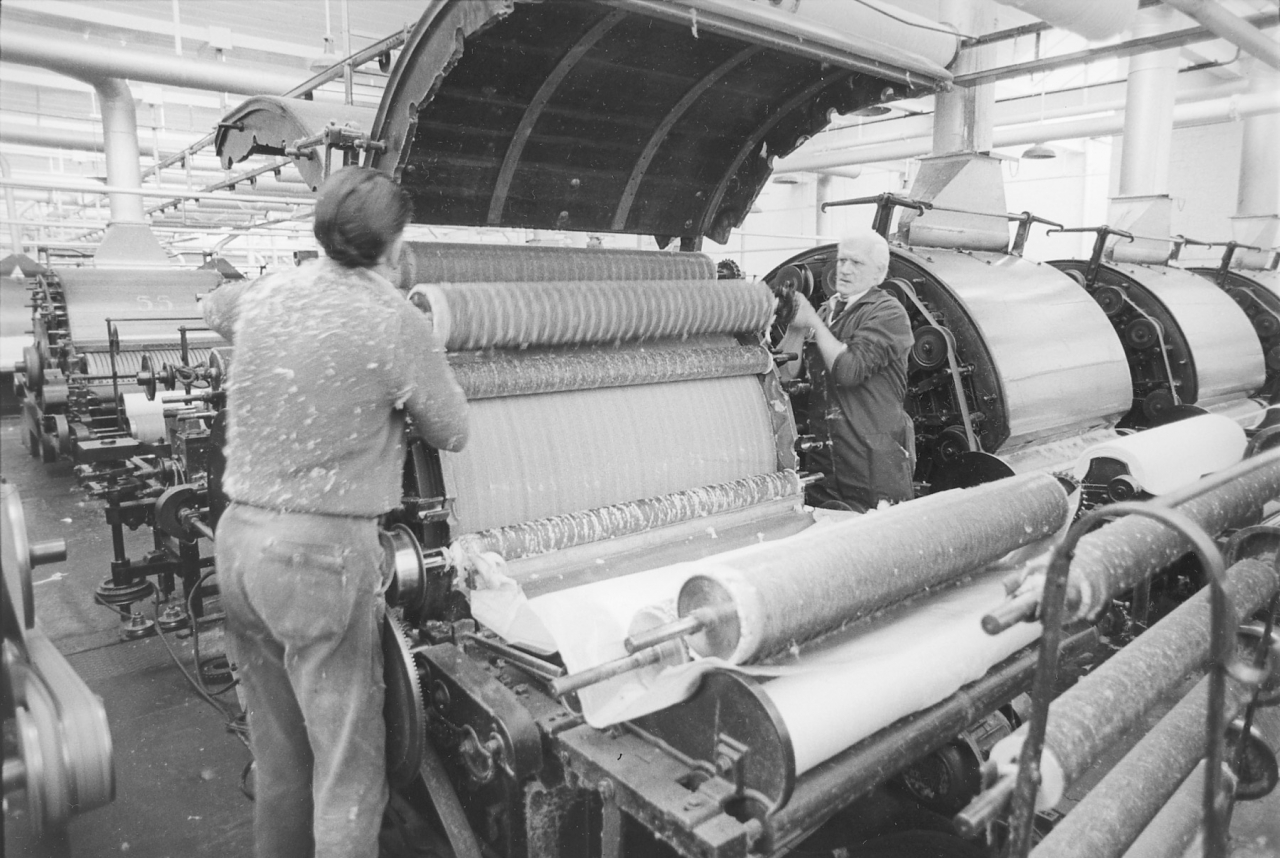
Charlie Gowers and Joe Pilling at work on a card.
Now then Charlie, what’s your official title?
R/C - Carder.
Just carder?
R/C - Carder.
Not overlooker or anything like that?
R/C - No it’s carder.
OK. And what’s yours, Joe?
R/J – Undercarder.
Undercarder. Sounds a bit like undertaker to me.
R/J – I am his assistant.
Very good.
R/C - But we are not just assistant, we work together. We are on an equal footing.
Yes. I was just about to say that. One thing I have noticed is that you obviously work very closely as a team, that’s right. Now, you don't have to answer this if you don't want to but I’m going to ask you when and where you wore born Charlie.
R/C - When I were born?
Yes.
R/C - I were born in Lonsdale Street in Haslingden.
Are you going to tell me when or not?
R/C – Aye, nineteen twenty-three.
Nineteen twenty-three. I won't do my sums now, I’ll do them later. So you've always been a local to this valley have you? [57 years]
R/C - Always worked in this valley.
Never moved out at all.
R/C - Never moved out.
And what about your family?
(50)
R/C - Well I have seven children. The wife died in 1967, the youngest were one at the time but somehow we survived, I've never given up work.
Good for you.
R/C - Fortunately we had a few girls.
It doesn't need to be girls you know? And are they in the textile trade?
R/C- No, none of them.
None of them.
R/C - None in the textiles.
And why is that?
R/C Well, it isn’t no longer the industry there has been, since they were born there have been fresh industries arrived. Now I've one daughter who has done a lot of modelling, shoes and things like that, who’s worked in the footwear and shoes and she’s also done other trades. She is more or less a housewife. Now another daughter who's a housewife but every now and then they come for her from the shoe works to make special orders which she does do [SG note. Even in the late twentieth century there was still a thriving outworker sector in the slipper industry which was a major employer in the Rossendale Valley.], and I’ve another daughter who works at Porritt's at Stubbins, wire weaving inspection. Scapa Porritt’s. And I’ve one son that’s always been a Social Security expert, and I've got one son in engineering and I’ve another son who’s also tried to be an expert on Social Security. [Charlie means that they have cracked the system and are living on benefits.]
But he isn’t as well…
R/C - Totally out of character, I don't know why, and I have one going to school, fourteen.
So would you say that they haven't looked for work in the textile trade because it simply isn't there any more?
(100)
R/C - They haven’t looked for work in the textile trade because it's no longer important. They look on it as a dirty horrible job.
What about your parents, were they in the textile trade?
R/C - My father and mother, my mother died when I was about five, in 1929, something like that. And my father was in the textile trade up to 1940 when he joined the Civil Service.
And did he come out of it because he saw a decline? Or because he wanted to change?
R/C - Well he were invited to take this job in the Civil Service and he did do.
And what did he do in the textile trade?
R/C - He was a weaver.
Was he born in this valley?
R/C- In this valley.
And have you got any brothers and sisters?
R/C - I have a sister, but deceased.
And was she in textiles as well?
R/C - At one time.
What about you Joe?
R/J - I was born In Haslingden in 1923. [Again, 57 years old]
That’s the same year is it? And you've always stayed in this valley have you?
R/J – Yes.
And your parents wore born and bred in this valley too?
R/J - Father in Crawshawbooth, me mother born here, yes, that’s the lot.
Well Crawshawbooth is near enough isn't it? And were they in textiles?
R/J – No, me father were a miner.
Was there a mine locally then?
R/J - At Crawshawbooth. Well, between Burnley and Crawshawbooth was where he used to work.
And was that opencast mining?
R?J - I don’t know. I think they went underground for it. Drifts. [Possibly at Cliviger where the Arley Seam was worked by independent mines until at least the 1980s]
Drift mining, yes. Have you any brother and sisters?
R/J- I have five sisters and a brother.
And what sort of jobs did they do? Were they in textiles?
R/J - Well they’re a mixture. They were in the slipper works and in textiles, weaving, more weaving than owt.
(150)
What persuaded you, all of you, to go into textiles when you father’d been a miner?
R/J - Well that’s all there were round here, as soon as you left school you got the first job that were vacant.
(5 min)
And that was textiles.
R/J- And you're straight in yes. I came out, I left this firm about 1950 and I went bus conducting for about two years and then I didn’t like the hours so I come back.
I think it was Arnold that was telling me that when he left school there was slippers and felt. Was that right? Felt?
R/J - Yes we had a big felt works.
…straight forward condenser spinning, and that was really about your lot yes?
R/J- That were it round here, really weren't it?
R/C- There was the fine spinning of course at Whitehead’s.
Whitehead, is that the name of a firm? Where was that?
R/C- David Whitehead’s at Rawtenstall.
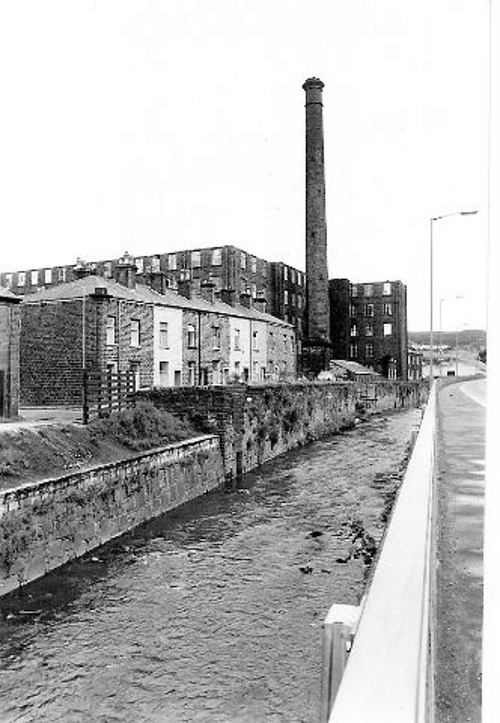
Whitehead's Ilex Mill at Rawtenstall in 1985. It was converted into flats.
Oh, Rawtenstall. And what were they making, do you know?
R/C- Well at one particular period I dare say they made more denim cloth than any company in the world.
And denim cloth would he classified as fine spinning would it?
R/C – Yes, made on fine spinning machinery. [Note that Charlie's version of 'fine spinning' would be any count over ten or twenty as they were used to anything down to 3s.]
And would that be condenser spinning, or would that be ring?
R/C- Fine spinning.
Ring spinning is that?
R/C – Yes, ring spinning.
So back to you Charlie. When you left school what was the first job you had, can you remember?
R/C - Lap carrier, what they call a lap carrier.
And where was that?
R/C- At William Robinson’s Union Mill.
And that's Haslingden?
R/C - Haslingden.
Haslingden. I don’t know too much about the firm, excuse me asking.
R/C- That's close to them.
That's close, yes? And how long did you stay there?
(200)
R/C- I stayed there till I went away during the war and I come back there.
They held your job for you?
R/C- They had to do. Nineteen forty seven.
Forty seven?
R/C - At the end of 1946 or 1947.
And were you still lap carrying then?
R/C - No. Grinding,
And to become a grinder, am I right, you had to go to night school and this sort of thing?
R/C - Not really but I did go to night school. to tell the truth.
So you were taught on the job more or less.
R/C - I went to night school before the war and before I went to work. I used to go to Bury, I used to catch the ten to six train and we used to finish work at half past five so we'd no time off, anything like that. We used to take our tea and eat it on the train going down and change at work see? Come back at night, probably got back to Haslingden about half past ten.
That was a long day then.
R/C - That was a long day, that was three times a week; that went on all through the Winter months right up to May. And when I came back I carried on with me studies but unfortunately there were no facility for City and Guilds or anything like that at Bury, so I had to go to Burnley and I carried on where I left off. So that were the same problem again.
And completed it?
R/C - Completed it.
So you have bits of paper that say you ....
R/C - Piece of paper, yes.
Good for you. So you came back to that firm, just remind me of the name again.
R/C- William Robinson’s.
Right. A grinder. And you stayed there until…
(250)(10 min)
R/C- When I got me City & Guilds I was told to go to a mill called Holme Mill, nicknamed the White Factory, on the road to Burnley. I had to meet them there, I had an interview and they offered to find me work there. I went there and I was actually losing three pounds a week at the time to go there. Well within about six month I’d not only got the three pounds back but another three pounds besides.
Well that was all right then.
R/C - That was all right.
As a grinder?
R/C - I started as a grinder and then I became the mule overlooker in six month because the mule overlooker was ill. And then I took over carding and I were there twenty one years.
And why was it called the White factory?
R/C - It was a nickname from as long as I could remember, I don't know.
It wasn't because it was a whitewashed building or anything?
R/C- No, I wouldn’t say so.
And whose mill was that?
R/C - J Stansfield.
Stansfield?
R/C - It belonged to, that was the trade name but when I went it was bought by Whitham’s, they were in the haulage business. And when they bought it, it had been closed, the whole mill had been closed for the war.
Ah yes.
R/C - But the machinery was all in and they actually paid for it £4,000, that was for everything, the building, the land it stood on, the surrounding land, all the water rights and its trade name. So it started from scratch. Now I went just, it hadn’t been going all that long, there were still a lot to complete when I went. And I worked with the managing director’s son, personally, as I work with Joe, twenty years.
And most of that time as the carding….
R/C - The carder, yes.
Yes, as the carder.
R/C- And it was my job there when he went on his holiday I used to do his job.
Which would be a lot of paperwork would it?
R/C - Which were a lot more on your hands on every time.
Yes, well…
R/C- They were a very good firm to work for, they appreciated whatever you did either by gift, being a pipe smoker, a new pipe, breakfast sets, table cloths, towels, they always appreciated it. And they had another good thing and all, towards the end, in the last few years before it finished I used to get seven pound a week bonus off them which was a terrific amount of money, it was half me salary.
(300)
And what sort at year we are talking about now?
R/C- Oh, the beginning of 1960.
Yes, It was a terrific amount, yes.
R/C - It was terrific yes. That was appreciation.
Yes. So what in earth made you leave?
R/C- It closed down. What happened you see… A chap called Clegg was the general manager. Now his son, the managing director’s son, worked with me in the mill and when they decided in the latter years to change the system, I could tell you this history back to front, because at that particular time, towards the end of the 1960s, 1969. It were decided that they’d modernise and get the new big package ring frames. Now I was asked personally about it, and I did give me approval, although I wasn't exactly happy the way things were done. They asked me where to put this machine, I was taken into the boardroom and asked by the father, the managing director and I gave me view where it should go, with the other ring frames. That were reducing costs and everything. But anyhow they decided otherwise and put it in another room in the mule room, they took a pair of mules out and put it in. Well, it was the worst place they could ever put it. Not only did they do that, they had to put a chap in charge of it who had no experience of the machine. There were nobody in the mill capable, including meself, of maintaining that machine and putting it right. It all worked an dials and fine chains, fine sprockets, there was all sorts of new things on it. And they were very successful with them machines at a firm in Rochdale, they're still going, George Riggs’s. Anyhow they put this chap in charge, he said he knew all about it . Well it were stopped more than it were running. Now it cost a terrific amount of money. So
(350)(15 min)
meanwhile they decided, his father’s getting old you know, so he decided to make his son joint managing director. Now that were a disaster, because in the working part you couldn't ask for a better man at engineering, anything. Anything at all he were skilled but he was awful as a managing director. Now the man that had been the general manager that’d run this from the start, who had worked personally close to them all them years, he resigned. And he left the firm a complete order book for twelve months. I gave his present to him, they asked me to give him it, it were a lawn mower. And from that day to finishing, that firm never got another order. The ring frame was for ever breaking down, it was being operated wrong, they were for ever having to send for the technician again to put it right. Well, this went from bad to worse. Things were so serious they started dealing with a waste firm. I just can’t remember the name, but very shady business people, they should never have had credit off them. They started getting the mixings off them on credit where they’d always dealt with the bank before, they dealt with them direct. Things went from bad to worse, we’d no production off this new frame to really compensate for the cost of it. So they decided, his father came to see me, him that had made his son the joint managing director. His father came and asked me what was wrong. And he said did I think there was anything wrong with his son running the place. Well I couldn't say that anything were wrong because I’ve always thought a lot about him because he was so good. So I said no, that he were all right. Now he said at that particular time, it’d be the end of 1970, he said that was the last five thousand pounds
(400)
he was putting into the firm, he'd already been putting in ever since his son had taken over. So when it came the following year, 1971, July was serious. I think this waste firm had a got a firm grip, he couldn’t budge them. They were so firm that he couldn’t buy off anybody else, he couldn’t even use the bank, and the bank had no confidence in him. So it was just before September when he sent for me and he told me they were going to go into liquidation and I felt sorry for him at the time because he were crying. And he said to me, he said “I know you blame me.” There was nobody else I could blame. I said “There is nothing to cry for.” Now since he’s left he went working for Longrow’s, a big textile firm. Well, they’re in everything and he’s so very skilled he took over the knitting side, so one fabric, things like that, it was no effort.(?) And he went up to Whitakers and he came and asked me three or four times to go with him. But I couldn't leave where my family was, I couldn’t uproot myself and go, you see they weren't without money, they had money and I was blood(?) And now he is the boss of Whitehead’s, he’s come back. Did I ever tell you about David Whitehead? He is boss there.
Yes. But he is managing that one all right is he?
R/C- Oh he’s learned the other side, the business side sufficiently. But he wasn’t efficient enough when he took that job at Stansfield’s.
Basically it sounds as though there was just no one to teach him, because if the general manager left
R/C – he didn’t have the technique. He was a chap who'd always worked with his hands you see. Nothing mechanical were beyond him, nothing, whether it were your car, loom, mule, ring frame or anything, he could put it right..
He was a natural engineer.
R/C - Natural engineer, yes. Been brought up to it.
But for you the community life and the roots of the family were more important than flying off to do a smashing job and perhaps a smashing pay packet as well?
R/C- They were, yes. At the time the salary offered in 1971 was almost eighty pounds a week.
(450)
Which is pretty good even now I suppose isn’t it.
R/C- It were good then.
So you came here then.
R/C – There were also the option of a car.
(20 min)
That must have been a difficult time for you.
R/C - As you've said it was more important to the family.
Yes. So you came here then did you?
R/C – Yes, I came to L Whitaker’s, I was invited to, L Whitaker’s. I was invited to Highams, they’re condenser spinners. And I were interviewed with a director called Mann, Mr Mann and I was on the point of going, but they wouldn’t let me go to the new plant they said that was out for at least six months so the only other plant they wanted me to go to was across the road here and there was a big snag there because it was shift work and that was beyond me. So I went to Sam Riding, he were the senior director at Whitakers [and he offered me a job] because I jumped at it even though I lost seven pounds a week, more than seven pounds a week from Stansfield’s. It was seven pound a week less but I got to join L Whitaker’s where I’ve been working since. But it was days, it was very important.
Because of your family?
R/C - Because of my family.
Well that’s a very interesting story Charlie. Can you match that Joe?
R/J - I could never tell a story like that.
What was your first job when you left school Joe?
R/J- My first job were at Slaters, Syke Mill in the warehouse.
Was that textiles?
R/J- Yes, where it's all weaving down Fields Road isn’t it?
Where is that, Haslingden? Yes?
R/J- Yes. About fifteen bob a week it were. So I went, after that I went spinning, learning to spin.
(500)
Same mill?
R/J- No. At, what were it called? Clough End Mill at Acre here.
In where?
R/J - At Acre, Hud Hey, Clough End Mill at Hud Hey. You know as you’re going on the way to Accrington.
Well as I say, I don’t know round here very well but as long as I can find it on the map I’ll be all right.
R/J- Oh you’ll find it. And I left there and I went to Birtwistles cut carrying for a good raise.
And what was that?
R/J- Well all the cuts that come off the looms, they had to he taken up to the warehouse and I had to carry them up. [Cloth carrier]
So you're calling the finished cloth cuts. Is that what they were called?
R/J- Yes.
Now that's interesting Joe, because I'm sure we never came up against that word from the Bancroft weavers. [It’s a common term but Mary hadn’t heard it before]
R/J - Cut carrying weren’t it Charlie?
It must be a local word.
R/J- They come on rollers now.
Oh I see, right.
R/J- Where they used to come out like one long piece of cloth and they called it a cut. [Joe's evidently talking about the old way of plaiting the cloth off the loom instead of taking it into the warehouse on a roller]
Because it was a certain length, yes. Right, now I am with you yes. So how long were you in the warehouse in the first job?
R/J- Oh dear.
About…
R/J- About nine months.
You didn’t stay there long.
R/J- No, I went to this Hud Hey. I wonder, what were that mill called?
R/C- Clough End.
R/J- Clough End, aye, that were it.
Yes, and that was where you were doing the cut carrying?
R/J – No. I were spinning at Clough End.
Oh I'm sorry.
R/J- What they call a joiner, joiner-minder.
So does that mean that you were sort of with someone else and they were teaching you?
R/J- Yes and paying you as well.
Ah, still that system?
R/J- Yes. Under the old system you got so much out of the office and so much off the spinner out of the bonus on the mule.
Right and were you working with someone who gave you a decent hand?
R/J- Well it were OK, fair enough.
And how long were you at that for Joe?
R/J - I stopped there till about 1940, that’d be about two years there. Then I went to Birtwistle’s to cut carrying and I was called up from there.
And so you came back to them?
(550)
R/J - I went back to Birtwistle’s got the same job which I didn't like, so I finished and went to L Whitaker’s.
Forgive me for asking but it would seem to me that cut carrying would be a lesser job than spinning, am I right?
R/J - Oh yes, aye but they seemed to pay more money there, it was a bigger wage.
So that was the more interesting thing.
R/J - Yes, they just went for money. Me father worked there when he come out, when they shut the pit down, he come down there and he said there is a job down there. I don’t know, about fifteen or sixteen shilling a week more but I couldn't pack up. See, you couldn’t
(25 min)
give your job up then, the war were on you know, and if you were in you had to stop in. It's funny is this though. So me dad said right - he said if he'll not, if he'll not give you your cards, go in at nine o’clock every morning and come home at three - he said and he’ll soon sack you! and he sacked me. He did. So I went to Birtwistle’s then and got the job. I had to go down one Sunday mornings and Jim Barnes were the manager and he says, and I were only little, I was smaller than Charlie. And he looked at me did Jim Barnes and he said “I don't think you'll manage here but come with me.” And he took me in the weaving shed as far as he could and he give me the heaviest cut. We put a strap round with a buckle on, put it on me shoulder and he said “Come on, follow me.” I went up these steps to the warehouse and I thought Oh!, I were on me knees. Anyhow I managed to get it up so he gave me the job but I had to go in on Sunday morning to try it
And you reckon that was simply because you were a small lad at the time?
R/J- Yes. And he thought I couldn't manage it. So I carried it up and he give me the job. I stopped there until I were called up, 1942, and I went back there .. no use, same job, it were hard job then. It weren't so bad when I were younger. So I went to Bury, I went to Holme Springs grinding, stripper and grinding over there.
And you were taught on the job were you?
R/J- Well I learned. I set to lap carrying. In them days we used to learn ourselves, didn't we?
R/C - Yes.
R/J- We used to like keep your eye on these jobs like because they were more money.
R/C – We were all self-taught.
All self-taught, yes.
R/J- We were all self-trained you see with watching others. And then when a stripper and grinder backed off I went for the job and Sam Riding give it me. Then they went on three days a week and I’d just got married and so I went bus-conducting. Until everything settled down and I come back here.
So when was the three day week? About 1950 was it?
R/J- Round about yes.
Went bus conducting and didn't like the hours?
R/J – Didn’t like the hours.
And then came back to L Whitaker’s again?
R/J- Came back to Spring Vale.
To Spring Vale then, as a grinder.
R/J - As a grinder yes.
And you’ve been here ever since.
R/J- And stopped here all the time.
So you have seen some people come and go.
R/J- I’ll say, I've been here more than twenty five or twenty six years now. May be on the carding in 1969.
Because up until then you were just a grinder were you?
R/J- Yes.
And In 1969 you were made what do you call it? A carder?
R/J- Under Carder.
Under carder. And you've been a happy team ever since? No you came in 1972 didn’t you?
R/J- No, I had Jim Sutcliffe were carder here.
R/C – I came to this mill last year, last January.
R/J- Well you've been here, in and out of here haven't you for a bit?
R/C - I've been here for a short time before.
R/J - When the carder's been ill.
R/C- But I took over Higher Mill. I went really to Higher Mill. [Another of Whitaker's mills]
Oh I see. I didn't really ask which mill it was.
R/C- And I also .. I'd only been at Higher Mill a few weeks and I went working with Sam Riding in Flash Mill on the ring frame, tape condensers, the non-woven machines and needling and rolling.
Needling?
R/C- Yes needling the laps, yes.
Yes, I’ve not seen any ring spinning so I don’t really understand how they work. So, at Higher Mill from 1972, am I right?
R/C: Nineteen seventy one, it was the first of November, I remember the day.
Nineteen seventy one … first of November. And you were at Higher Mill until you came here January 1979?
R/C- I was at Higher Mill about .. from the first of November until about the last week in November. And Sam Riding wanted a job doing, down at Flash Mill…
Sorry, yes.
(30 min)(700)
R/C: .. So I went there for three years, and I could have stopped there, I could have been there yet, but I wouldn’t
…have you…?
R/C: Well I didn’t work shift work, but it was round the clock, twenty four hours there, and I have on occasions, very rarely, looked after the housewife shift, and just came in once to look after ‘em once on Sunday, as I refused ever to, I didn’t want to stop there. Because gradually, as time went on, they would have expected you to be on call, and all sorts. So when I got the opportunity to come here one time, one day, when Jim Sutcliffe the carder were off, it were an ideal opportunity to get away. So then I asked for to stop here, which I did until I went to Higher Mill, in… it was after July holidays, weren’t it? I don’t remember the date, probably about 1974 or ‘5, and I stopped down there.
Until last year?
R/C- That’s right.
So you’ve certainly spread your wings round L. Whitaker’s and Son, haven’t you?
R/C- Oh, partly.
How does .. perhaps its an unfair question, but how, how does this firm compare with, with others, ‘ cause you’ve seen quite a few of them. Well, either of you.
R/C- Well …
R/J- A bit tight for money, that’s all, you don’t get the same commissions.
R/C- The layout has been very good. I absolutely liked the way everything had been done, they tried to modernise but from leaving Stansfield where I had been, the production of this company, any of the mills, was nowhere near the productive capacity or the quality for that matter from the mill I had left at Stansfield’s. But there we had one advantage, we had a better quality of mixing than what they‘ve ever enjoyed at L Whitaker’s and that was probably the point, a fair bit of quality material to start with.
At Stansfield’s yes?
R/C- That was the important part.
So what you’re saying really is that twenty years ago this layout was fine but because…
R/C- The lay out was fine.
Because they haven’t modernised the actual machinery.
R/C – They’ve respaced the machinery at L Whitaker’s. You see, Stansfield’s were the first condenser spinning mill to have every machine on individual electric motors in 1957 which was unheard of. Now we were the first firm to stop using castor oil to grease the leathers, we went completely off them, went over to synthetics and saved in the region of about four or five hundred pounds a year on castor oil.
Really? Because it’s still leather rubbers here isn’t it?
(700)
R/C- Yes, we still use them, castor oil you know. And that was done in 1957/58 so they saved a terrific amount of money.
R/J- Well, they had them rubbers on here Charlie but they didn't seem to be as good as the others.
R/C- Yes, it didn’t work here.
R/J - They weren’t as good as leather.
R/C- They had the same synthetic rubbers when I went to Flash Mill on their tape cards and they had no problems at all when I went, ‘cause I were on them.
But presumably they would be designed to take synthetic rubbers were they?
R/C – It were very important when getting synthetic rubbers in getting the right type of synthetic rubber for the type of material you are putting through. And these firms, a lot of firms would con you into buying this, that and everything and it doesn't work. So you really want your material tested in their rubbers first. And at that particular time when we started they were trying to sell them you see and we were the first. So they came and we could have all the facilities .. the first pair we put on in 1957 was absolutely horrible. Well that pair was still up when that mill shut. See they had they had their ways and techniques and we followed them to the letter. You got full instructions, and it was enough to send you through the walls, everything were wrong. They’d gone wrong somewhere in the type of material we were putting through. So I just altered them one day, forgot everything they’d said and they were still up when we shut down. It was agony it was agony. But that were very important we found out later you see, after that pair. That pair were free, we got them for nothing to that there was a chance of us trying them. And they only cost twenty pound a pair to buy, so they were a terrific saving. And they put the whole mill up after that. Saved between four and five hundred pound a year on castor oil.
(35 min)
How much would they pay for leather rubbers (?)
R/C - In that particular time? More than that,
R/J - Ah they were dear.
R/C – It’d probably be about twenty six twenty eight pounds a time. As I say they were tremendous, production wise as well.
When did L Whittaker's go on to electricity Joe?
R/J - I forget.
Yes, the usual go by, I just wondered if you did know.
R/J - See our cardroom were in the middle room.
In the one that ...
R/J- Our Cardroom were in the middle room where them two pair of mules is. And we had breakers in the bottom room and a pair of mules and an odd mule. Well I don’t know when they changed it, it’d be in the 1960s.
(750)
R/C- It was early 1960. I remember the time when they went to Coppull Mill and they bought the whole mill machinery including the mules and they re-opened them again. I should imagine that was when they went electric.
R/J - They put them all down here them yes.
R/C- Yes, they did.
R/J- Aye. We’d to take them out of the middle rooms put them in here. Then they bought them breakers, finishers off Coppull and we'd to crash our others out again and put them in again. We put them in twice. We fetched them out from the middle room down into here and then they bought the Coppull so we… Well, they got a gang, them Varley twins didn't they. They come and they took them out and we put the others in that they'd just bought, in this place.
R/C- But they had they had a very efficient way of doing it.
R/J- Oh the lads had.
R/C - When they bought machinery they had a system of boiling it, cleaning it and it were very good. I don't think there’d be another firm in the County of Lancashire would do the way they worked.
R/J- Full of grease when we got them.
R/C – Isn’t it, excellent.
R/J - They stopped during the war I think or just before the war.
Sort of steam cleaned was it?
R/C- They had them clean, that was Sam Riding wasn’t it?
R/J- They boiled, boiled them didn't they?
R/C- Aye, they boiled them.
R/J- Boil everything.
R/C- Yes, boil, clean them up.
You mentioned the Varley twins? Where do they come from? Now, I just ask because there’s some people up my way who…
R/J- They come from Manchester way. Yes.
R/C – Yes. Manchester way.
They were…
R/J- They were two twins weren't they?
R/C- Identical, just a big bigger than me, strong as horses.
R/J- yes. Now they could move machinery. I believe one of them’s jiggered now.
R/C- Yes.
R/J- No wonder!
And, and they were in the trade of moving machinery?
R/J- They were in scrap. They’d buy it, take it out and sell it.
And you mentioned earlier that you had to crash the cards or something. Do you mean by that break them up?
R/J- Break them up yes.
And then discover that you had to put then back together again?
R/J- No. We fetched them out of the middle room into the bottom room and got them all going, got them running. And then they got them from Coppull so we had to crash them out.
R/C - We did, Take then out when they'd only just put them in.
R/J - We hardly had them in a month, we had to crash them out again.
Do you think all this rather sad closure has now come about so quickly?
R/C - Well in my opinion it hasn’t come about quickly at all. I could foretell this years and years ago.
R/J – They’d been closing for years you know round here. We had a lot of mills in Haslingden.
R/C- But unfortunately there is a way of spinning this type of sub-standard cotton, waste we might call it, waste products. There must be a means to get it out, production wise so nobody can touch you for price; but unfortunately so far as I know nobody's thought it up yet.
You mean another way to this [process] that has a quicker…
R/C- That doesn’t take all this space and all these people to run it. There must be a way.
Yes, there are actually quite a number of processes aren’t there?
R/C- There are far too many.
R/J- Too many hands yes.
Yes, it should yes.
R?C- So that’s what is a big fault. See, any waste spinner that’s modernised, he’s no longer a waste spinner. He’s spinning better quality cotton.
He is a ring spinner or open end, that’s it yes.
R/C - Or open end spinner, yes.
R/J- See, it were all done on the cheap years ago weren’t it.
R/C- Of course it were.
R/J- There were nothing thrown away. It all had to come back, be re-cycled again.
But that’s the simple thing about this, it can be re-cycled with these processes you have got here.
R/J- But every time it's put through, every time we’ve used it once there is less body in it the next time and the next time there is nothing in it.
When you say body do you mean length of fibre?
R/J- Yes, length of fibre.
Because it's been broken up so many times?
R/J- It’s all knocked out yes. Oh yes.
But as long as it’s mixed with some decent stuff it’ll be right won’t it?
R/J- All that decent stuff, we don't get so much of that do we Char1ie?
R/C – No, they’ve never had a fair amount.
R/J- That’s what we were on about, the mixings, before.
R/C- You see the cost of the mill is based on it’s mixings. Halfpenny in a pound increase in the cost of the mixing is a terrific expense to the spinners and they can cripple a firm. Or a ha’penny less and they can get it on the spindle and they're laughing, grand. If they can make the mixing a ha’penny less which they always try to do.
You've got Glenys come to see you I think.
Yes Charlie, you were saying about the ha’penny making really all the difference. Now I can see what you mean by that, it’s a very interesting way of putting it but going back to what we are talking about, the mill closing down, you said that you knew it was coming.
R/C – Definitely.
Why?
R/C- Because it was reaching the end of the line, especially when we came. Both Joe and I were of the opinion that the re-conditioning that was necessary, which wasn't allowed to be done. Which two honourable persons who had a card would have paid for the card but wouldn’t pay the few pounds to have it re-covered. We’ve had difficulty getting anything to do with keeping the job running properly.
(850)
So really they missed the boat here in terms of they should have, some years ago, either re-condition them or get new stock in and they didn’t do.
R/C- It would have been a waste of money to re-condition the plant because the plant is too big. It covers too much, it needs too many people to run it. No, it hasn't been efficient for years, for the lost ten years and it’s gradually gone worse. There has been the problem with all the other mills closing in that you can no longer buy the material we require. As the other mills close they have no waste product. So that was an obvious one and it’s been gradually going worse and worse. This year I've seen it reach a climax but it was practically impossible to get material to keep this place running, even cheaply. Anybody who had any waste wanted a top price for it.
Since you've moved around Whitaker’s a bit, what about the other mills that Whitaker’s have?
R/C- Oh I’d say that Whitaker’s, in their day, was the right size. But they’ve never shrunk with the times, they’ve never rationalised. They've never done that. They could have done that ten years ago even when things were [declining] which would never have shown a profit., where other companies have done this. And a typical example of that is Higham’s, they were still top profit makers in the hard times because they did it..
And they’ve, they’re on the waste side are they, as well?
(45 min)
R/C- Higham’s closed down a terrific number of mills, more than L Whitaker’s could ever dream of having in condenser spinning. And they bought a mill in Rochdale, Grape Mill, and going back over ten years ago they cleaned every bit of machinery out of it and re-organised it on a continental spinning system. And I went to look at it and I was amazed. It was the first I’d ever seen and it would have served me to work there. But unfortunately it was shift work and I couldn’t take it but it was marvellous.
And they are still showing a profit today?
R/C - They are showing a profit. I used to talk to travellers when I worked at Stansfield’s and they told me their bleach yarn and their comber yarn were the finest example of no [variation in] shade, there was almost the same shade or colour of yarn no matter what it was. And it is because of the system they’d put in, that’s all. That was Grape mill and it’s still going.
(900)
R/J- I think they slipped up here, like we can get no more weight off here than we could twenty years ago. No matter what way you do you don’t get any increase.
R/C - See, that’s where Higham’s scored.
R/J - That's right.
R/C - They started this mill, they re-equipped it and they made sure they could make enough production there to satisfy the present day need when they started. Now with going on a modern system they found the rest of the mill which was a large mill, which was empty, as they shut down the other mills they could put the machinery in there and gradually increase the production. So there was always an increase and all under one roof.
SCG/27 June 2003
6,802 words
LANCASHIRE TEXTILE PROJECT
TAPE 80/SHI/02
THIS TAPE HAS BEEN RECORDED ON APRIL 30TH 1980 IN THE CARDER’S CABIN AT SPRING VALE MILL, CHARLES LANE, HASLINGDEN. THE INFORMANTS ARE CHARLIE GOWERS, CARDER AND JOE PILLING, UNDER CARDER. THE INTERVIEWER IS MARY HUNTER.
OK? Well we are feeling a bit better now we've had our lunch. I think are we? And perhaps if we start now looking at the spinning folios. Joe, you've got number 1 there have you? {Not sure why but Mary has started by looking at Spring Vale folio, breaking pictures]
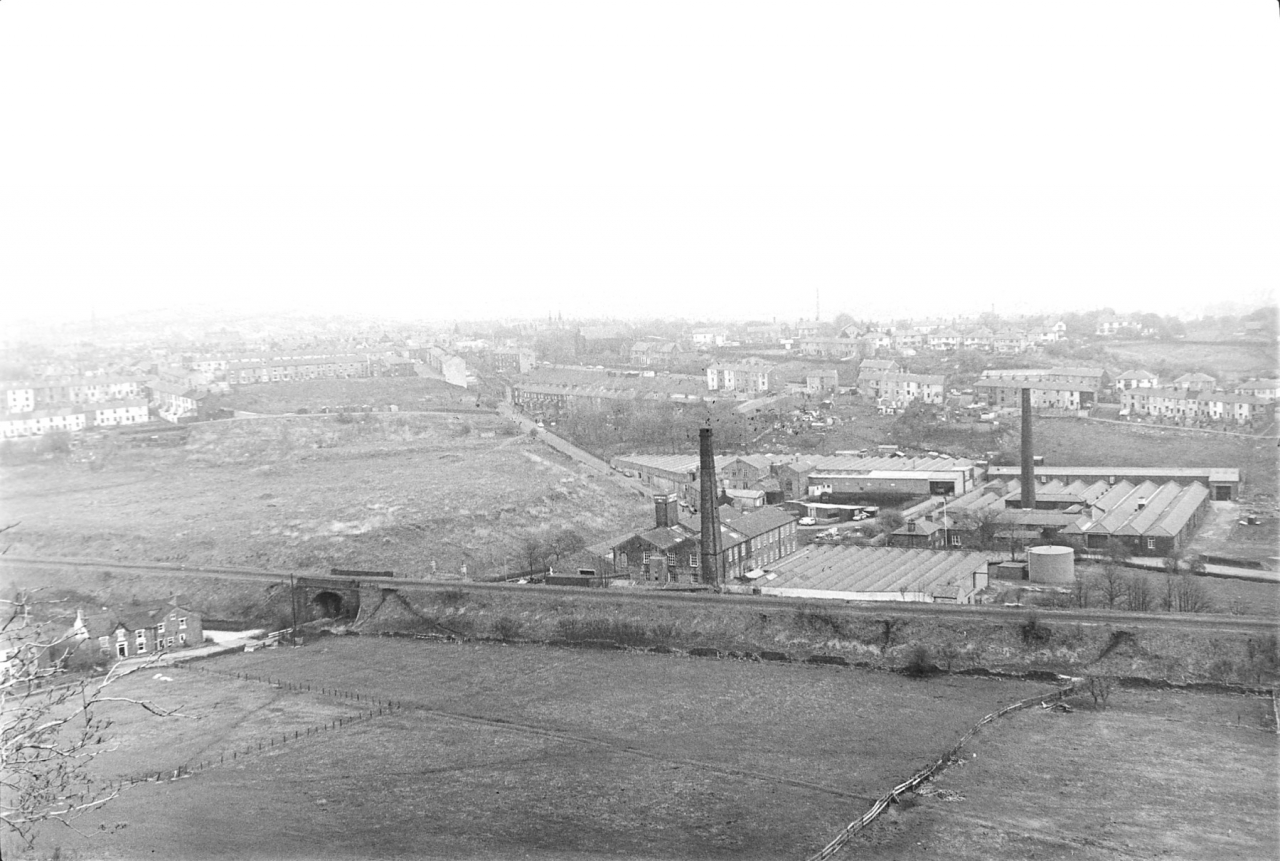
R/J - Yes.
Now then, what have we got there.
R/J - Well we’ve got the view of Spring Vale, of Waterside Mill.
R/C - We've got the views of days gone by ...
Views of day ...
R/C It shows the railway which is no longer there
R/J Yes, that's it.
There's been a lot of change really in a year, hasn’t there?
R/C - Terrific change.
Because they're building a motorway through, are they?
R/J- Yes, the Flip’s there. [Chris Aspin tells me that the Flip was a nickname for the Dyer’s Arms.]
R/C- Yes, where there is the pub.
Oh the pub in the bottom left hand corner is it?
R/J- Yes.
R/C- They used to buy beer at the pub for the devil workers, the dust workers. Every day they got a pint of beer, originally.
When was that?
(50)
R/C - In years gone by.
R/J - Years gone by. I can't remember that here. But we used to nip over for a pint at dinner time and at night.
R/C – Yes, the old Flip.
Which is Waterside Mill.
R/J - That one right opposite.
Opposite Spring Vale
R/C Spring Vale
R/J Yes.
Which motorway is it that's coming through?
R/C - I don’t know what it’s called.
R/J - It's the Haslingden by-pass isn’t it?
R/C – Yes.
Oh just a by- pass. It’s not…
R/C- It’s a by-pass road.
R/J - It's the Haslingden by-pass yes.
R/C - Only a by-pass.
Very good, yes. If we have exhausted that one. Now then, number 2.
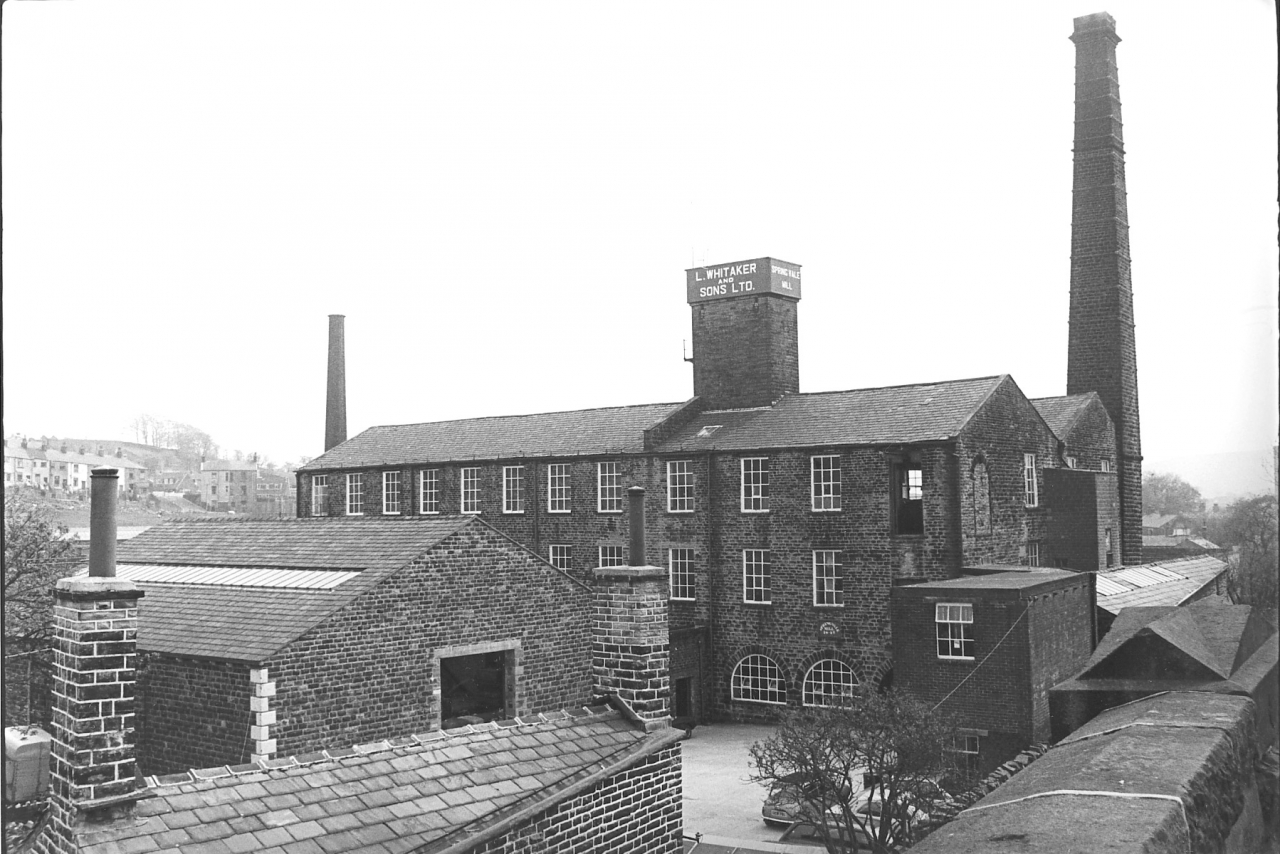
R/J - Number 2. We've still got a view of the Spring Vale.
R/C - But there is progress there with another building that's been built in the last twenty years, a new warehouse.
Which one's that?
R/J - Bale warehouse.
R/C - To carry the stock of bales for the expanding trade at the time.
Oh yes, where I park outside . Yes, so the warehouse that’s used now is an addition to the 1847 build.
R/J- It’s been added.
R/C- And one thing about that warehouse, it stands in the place where the original Mill Lodge was.
Does it?
R/J – Yes.
Now then, because it was a water mill was it?
(100)
R/C - Not a water wheel but it was the same sort of water supply.
R/J - It were steam, It was driven by steam.
R/C - By steam yes.
R/J- And we used to get water from there.
What is that on the top where they've got L Whitaker & Sons Ltd, was that full when it was steam?
R/J- No that’s, I think that's for the sprinklers is it? Emergency supply.
R/C - That was a supply for the fire supply, it was the highest point of the mill they had.
Yes. For gravity feed.
R/J- Yes to fill that up. And that was to get free water in days gone by, with the rain, being such a rainy district it soon fills up. [Wrong actually, it was filled from the mains and in the event of fire topped up by the sprinkler pump]
Yes. I gather, I don’t know whether it's exactly correct, but it was a water mill until 1847 when it was pulled down and immediately re-built.
R/C - Oh I don't know.
You don't? No. On number 3 it tells us of course when it was built ...
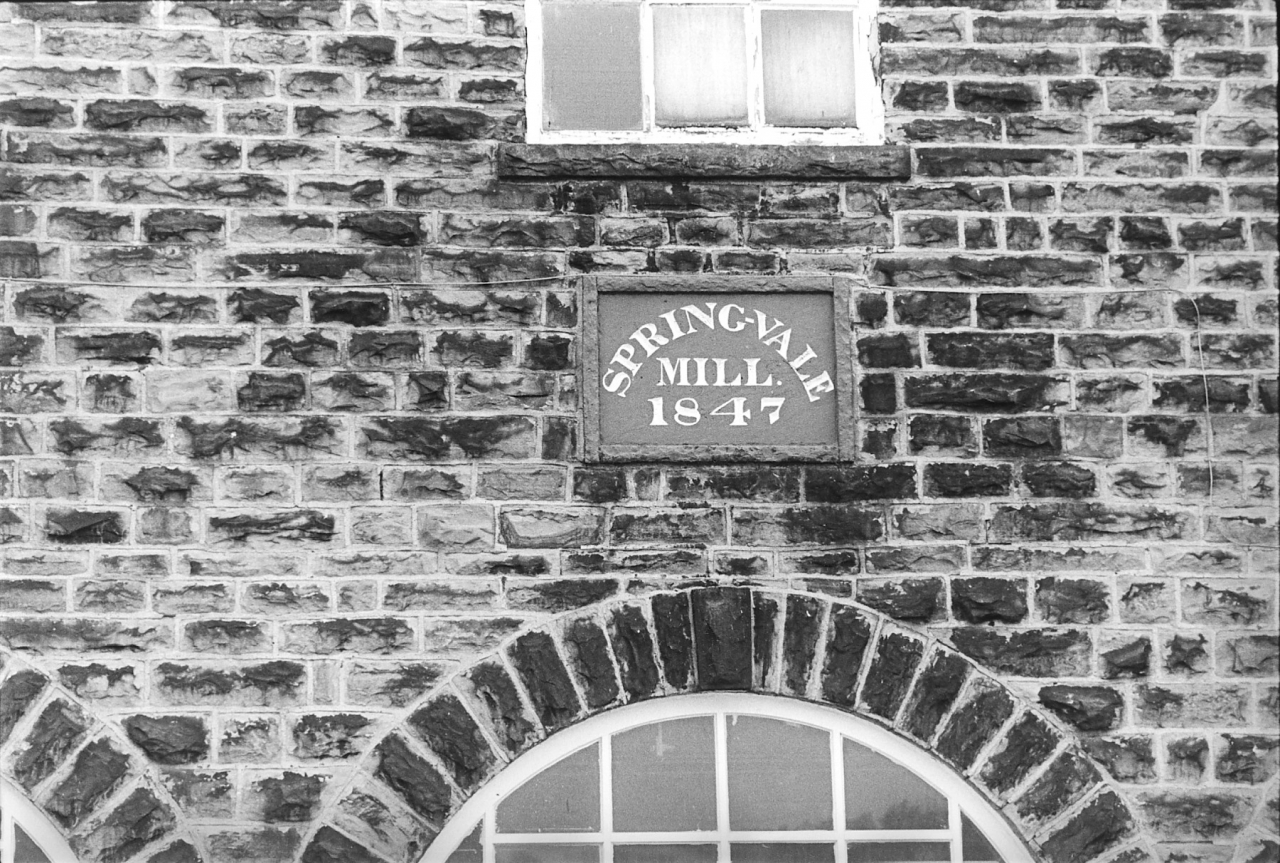
R/J the date is 1847, yes.
(5 min)
Is there any reason do you think for the…
R/C - The archways?
Yes.
R/C - Yes, they were the original doors.
Were they?
R/C - That's where they used to put doors in old mill buildings. It was always in an arch. They built them that way for a great strength of the wall.
I see.
R/C - More pressure, the more pressure went on there and it held it.
(150)
So that’s now the windows into the devil room isn't it?
R/C - No they are .. just the same an you'll see at the museum.
Yes they are. Those are the ones here, aren't they?
R/J- Them are them.
Are they?
R/J – Yes right in the devil hole.
R/C - Number 4 ...
Now then, number 4
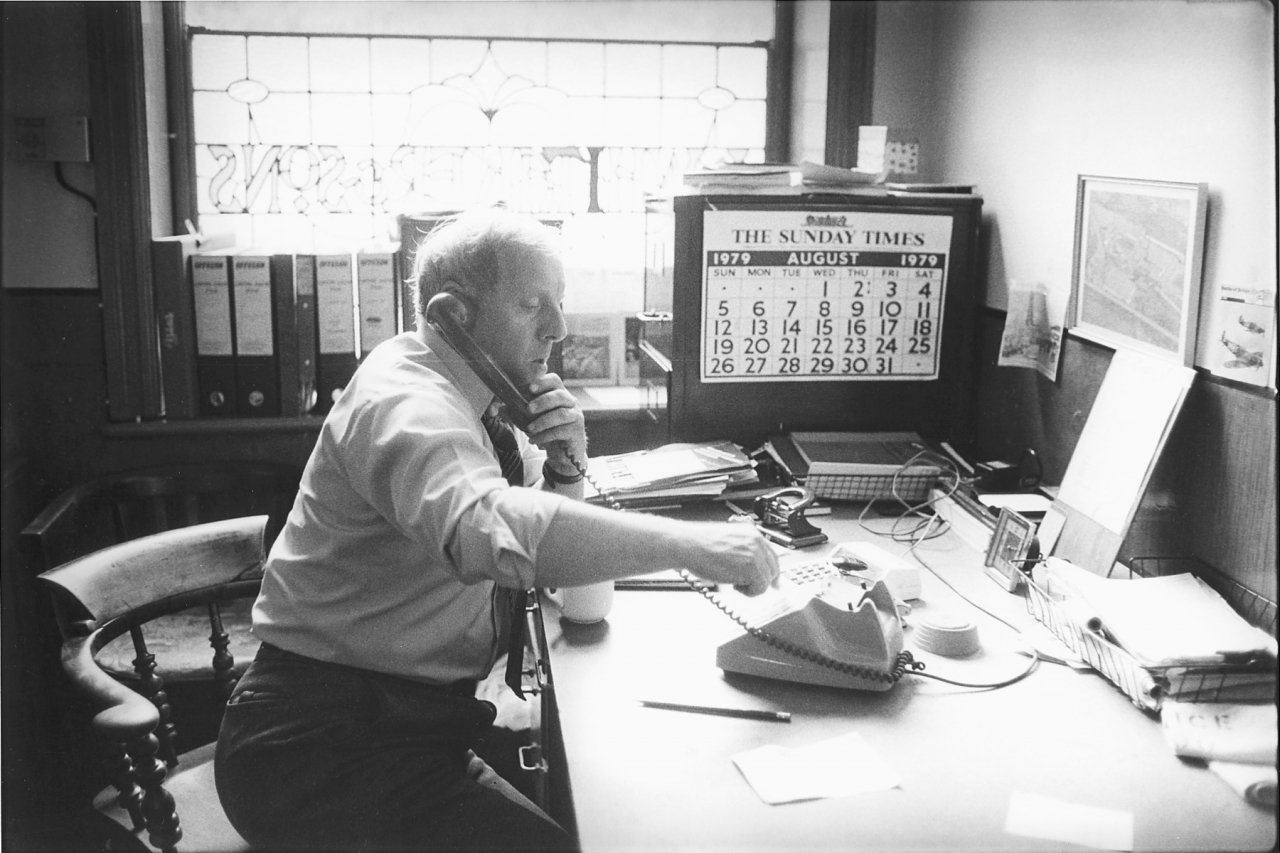
R/C - Ah well, no comment there as I can’t see owt can I? We have no actual comment have we?
R/J- That's our manager working hard.
R/C- Working hard.
Yes, well I don’t know what I quite make of that. Oh yes you are moving on too aren't you?
R/J- Yes.
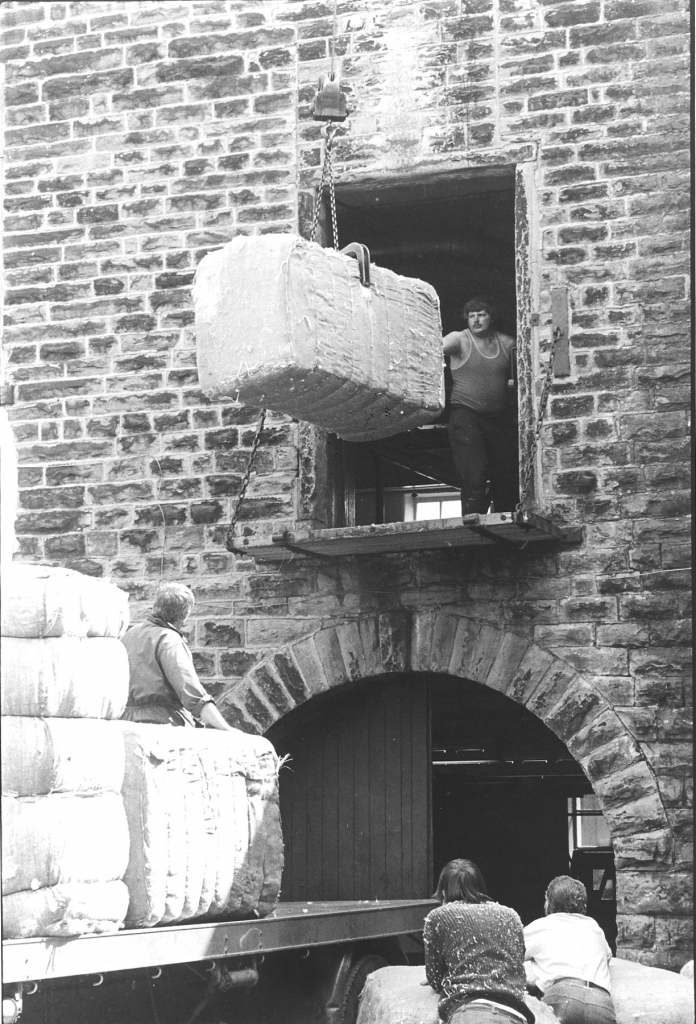
R/C - Number 5. we are on number 5.
R/J- Well we .. we can’t say much about that .. can we? [number 4.]
R/C - No we can’t.
R/J - Only it is a nice calendar. [I always got a calendar in the pictures if possible. Good date evidence if all else fails. SG] Number 5 now, the loading bay.
That’s the waste coming in, is it not?
R/J- Yes that’s how they unload the wagons.
What sort of waste in that, do you know off hand?
R/C - Cop waste.
Cop waste?
R/C - All cop yes, the cleanest waste yes.
Which doesn't have to go through the devil room am I right?
R/C- That, that goes through the devil. It doesn’t have to go through the Jumbo.
R/C- Yes it goes through the Jumbo.
R/J- This is the Jumbo waste this lot. Yes. It's what we call ‘ring and winders’.
R/C- It’s the cleanest waste you can get. It's already been processed, It’s already been spun, and it…
R/J – It’s been used.
R/C – It’s been cleaned and it's the best waste you can get.
Even though it has to go through all the processes.
R/C - Yes still the best. The biggest trouble is breaking it, making sure it’s broken to the best of your advantage, if you overdo it it spoils it and if you don’t do enough it's hard for spinning and it leaves all thread, spun thread.
R/J - Lots of bad ends.
Which waste is it that doesn't have to go through the first stage then and comes straight on to scutcher?
R/J- That's the comber bales.
R/C – That’s the comber bales yes. All the other waste.
R/J- We haven’t come to them yet.
Right, sorry. Are these all the same bales on this wagon?
R/C Well no, they don’t look all the same.
R/J- No this is the comber bale, here.
The upstanding one.
R/J- Yes. And these are for the Jumbo. You can tell that when he’s taken them in the middle room. The rest go to the top room.
What do you mean by the top room?
R/C - Right at the top of them all, the store room.
Oh have you. Oh yes there is. I've been there once.
R/J- Yes. That’s where they store them. And when we need them they lower them down back into the middle room.
Ok I see. Yes.
R/C - Right.
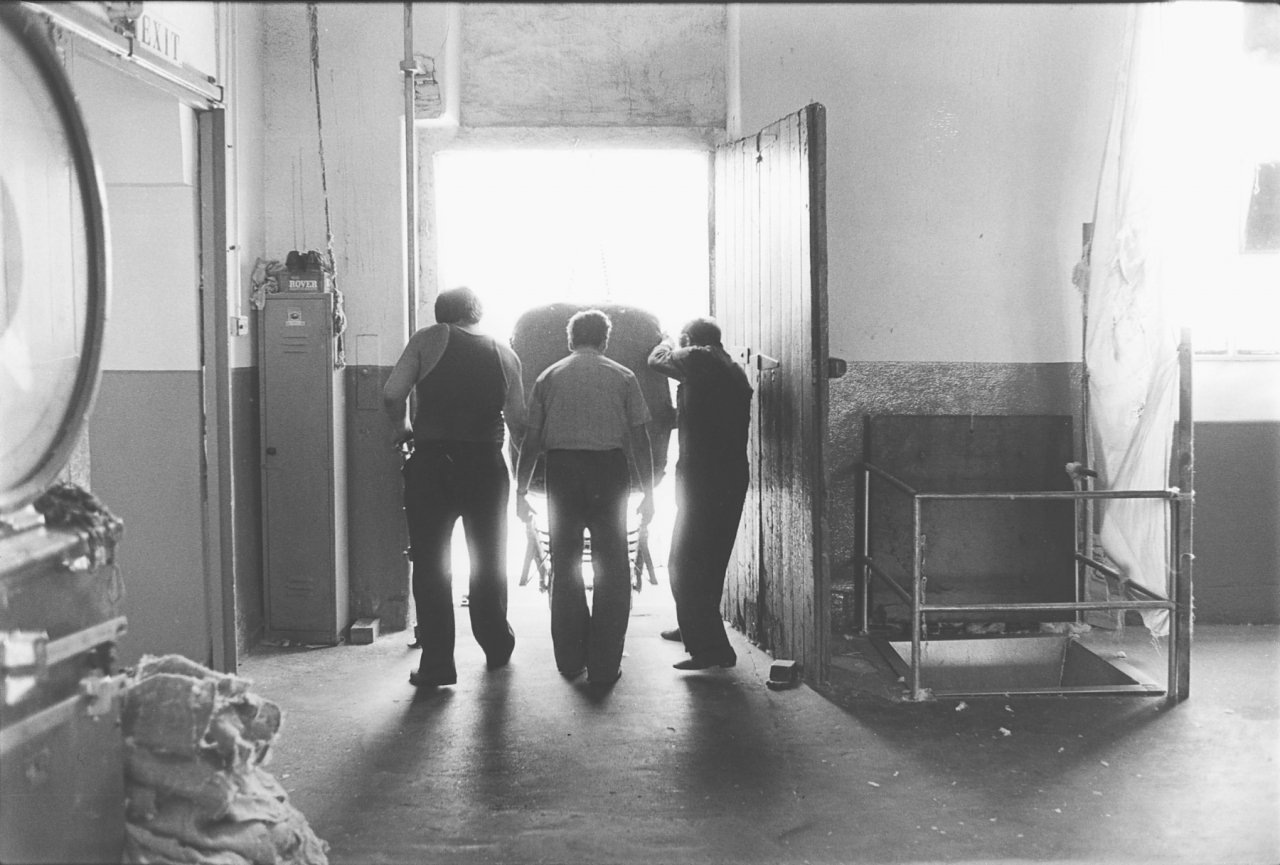
R/J- Number 6 coming up. Oh it just shows them taking them in. It just shows them taking them off the crane and fetching then in to weigh them does that one.
R/C- Straight on to 7 from there can’t you.
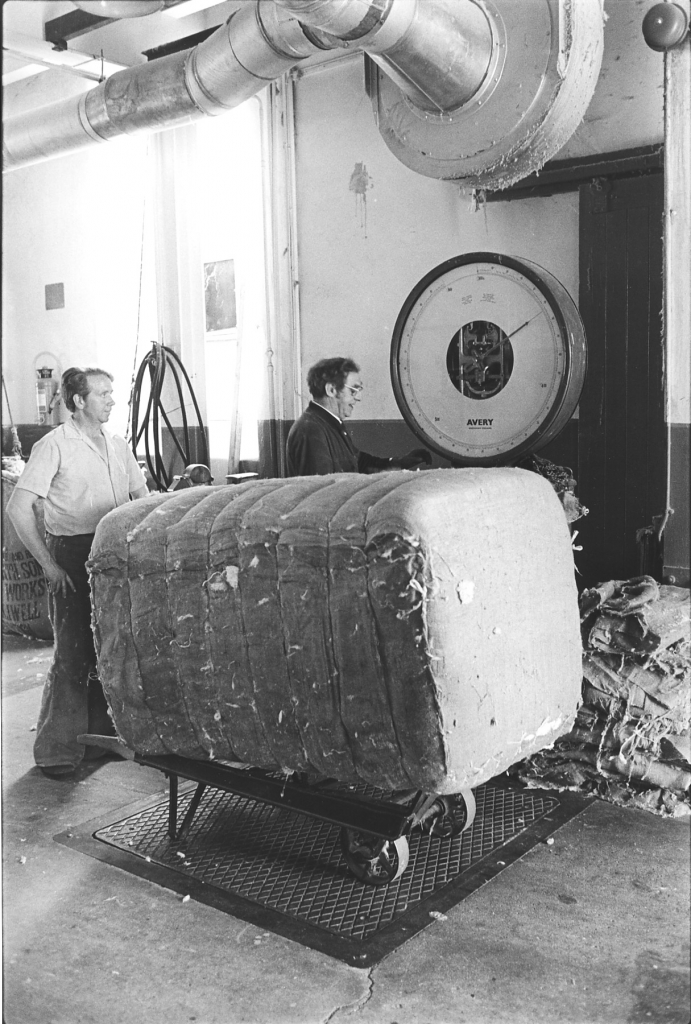
R/J - Now he is weighing them.
R/C - On number 7 It shows the process where the weight is checked to make sure they're getting the right weight for each bale's number.
(10 min)(250)
So each bale is weighed before it's sent out and you have an invoice or whatever, you've got to check it.
R/C - So they want checking.
R/J - I'm just waiting there.
And are they usually right?
R/J- Not so far out.
R/C – No, never so far out. And what’s a very important fact is when the wrappings are taken off, the sacking and the wire, they should be weighed.
The sacking and the wires?
R/C- When they've all been taken off they should be weighed and checked again.
Yes. Before…
R/J- For they allow you a tare weight.
R/C- For as long as I can remember when we used to get our to bales in all that were extra you see, extra cost, so it was put down. See, it was gross weight and net weight so you had to be very careful, and that were very important to check those.
Yes. I am with you, yes.
R/C- It’s loss, say you were buying something at twenty pence a pound and they were charging ten pound, well they shouldn't have been for the ...
Because of the total weight of all the sacking.
R/C- And they’d go on and on and on ... it you keep checking they’ll keep on right.
Yes, do you check weigh?
R/J- Yes. Aye we still check. But we don’t weight the packing now, it’s a standing amount now, so many kilos for tare weight don’t they.
Tare weight? [When weighing something contained in or carried on something else there are three key weights: Gross which is the total. Tare which is the weight of the packing or wagon. Net which is the actual weight of the goods.]
R/J - Yes.
That trunking at the top there what’s that?
R/J- That's to take the dust from the machines that we'll come on to.
R/C - That's an extraction duct.
R/J - We should come on to on picture 8 I think.
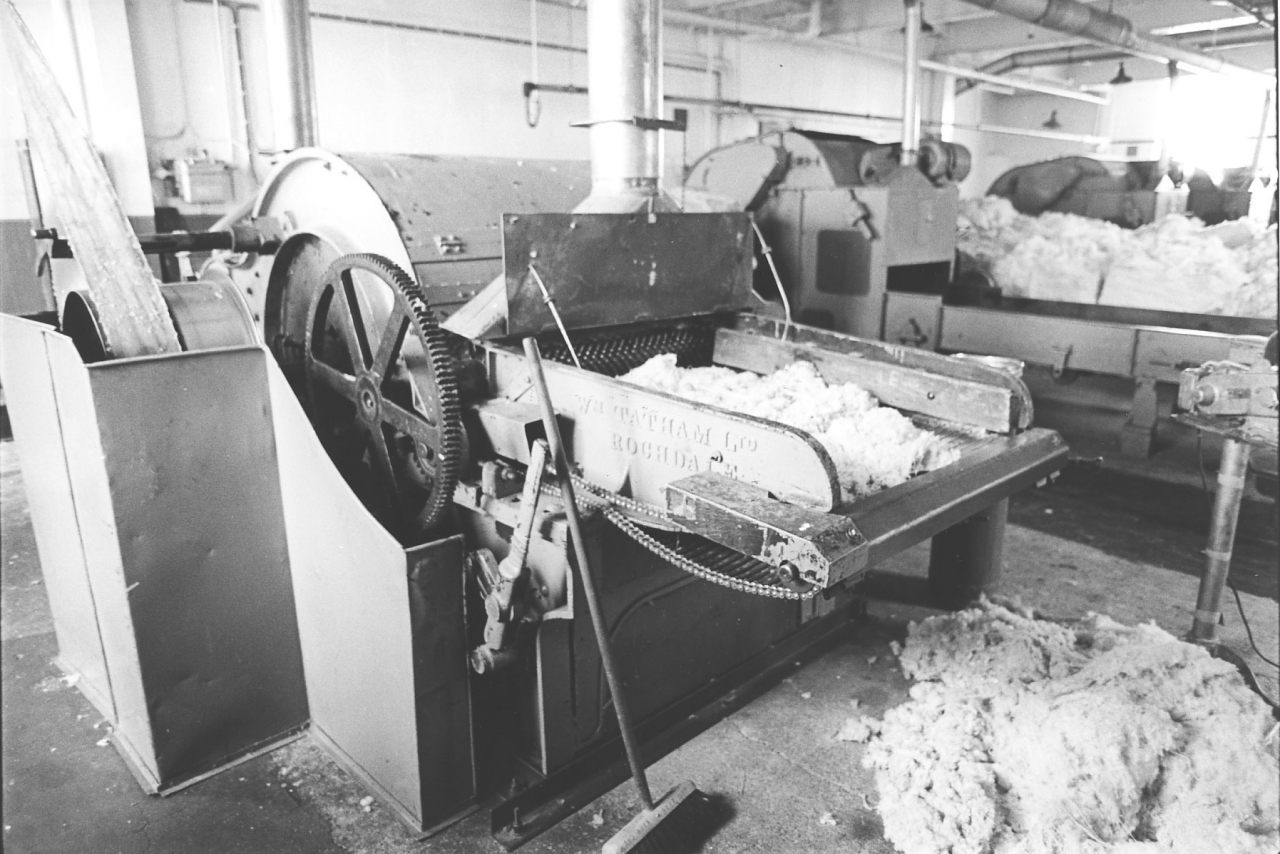
We’ll find out shall we?
R/J- Ah, there you are.
R/C - Page 8. We have arrived [The Jumbo]. This is actually a cop bottom machine, on the old scheme, the only waste there used to be was what remained on the weaver’s cop, in the weaver’s shuttle, what the weaver didn't weave off, just a small amount. But as the years have gone by there isn’t enough available so they’ve had to use full cops or any type of thread waste they can get hold of causing nothing but trouble to the machine because it wasn't meant for it. The machine had to be adapted, it caused break downs, in fact it were dangerous.
Was it?
R/J The jumbo?
R/C Yes.
R/J- Oh aye. We’ve broke some wheels on that haven't we?
Go on…
R/J- And then we got it modified with a motor driving the front. Instead of one belt driving all the machine we got a motor driving the front part of it and then the ordinary drive just drove the cylinder.
R/C - It were causing so many break downs and so much cost, the cost of getting the wheel made…
R/J - It were a hundred pounds a wheel.
R/C - It were beyond what the machine were worth.
R/J- We were going through 'em every day.
R/C - Simple modernisation would cost the firm not a penny because they already had the material, and they had the fitters and electricians. The job was done very quickly, and driven by belts and that were the end of the matter so there’d never be trouble again.
R/J- We haven’t had trouble since.
When was that done Charlie?
R/C - Last year. This time last year.
R/J- ‘Cause I remember, I remember that for a while last year it was out of action would that be then then?
R/C – Yes, that was the time.
R/J- He should have got a photograph of that wheel.
R/C- Yes.
R/J- That were it weren’t it?
(300)
What, the cog wheel that we can see, the dark one?
R/J- Yes. That wheel kept breaking. It kept breaking straight to pieces. Come right out, about six teeth.
And that’s what you mean by being dangerous, do you? If that was flying out all the time ...
R/J- Yes it used to fly out.
R/C - The old one, they left it rather late to do this. Like Joe and I both knew it were far better to modernise with motors all round and drives in the different sections.
So that if it broke down there's only one section to ...
R/C- well, they break down of course but any breakdowns now are so limited and so it [impossible to run it without breakdowns]
R/J - It was the way it were driven.
Do I understand then from that, that nowhere else will you find ... a what do you call it, a cop…
R/C - Cop breaking machine.
.. Cop breaking machine like this, because you've done your own adaptations to it?
R/C- On that front bit I admit though I don’t know whether they are still in existence that have done these things years and years ago.
R/J- Yes, you won’t see another one like it.
I see.
R/J- I don’t think that they'd done it like this though.
R/C- All they did, they did away with they the big driver and they used a lot of extra motors but there's a big snag in using more electric motors, it's more expensive. One electric motor getting a thing going like this, it's cheaper to run it, don't use the same amps.
R/J- By the way that’s not the wheel that broke.
Is it not?
R/J- No it’s at the other side.
R/C – No? The other side?
R/J- You can't see it.
Oh well, we might do a bit later on. How long did you have to have them safety screens on?
(15 min)
R/J- We’ve had to have them on. Every time the factory inspector comes round we’ve got to put one on that.
R/C- We had it over the years.
R/J- They've had to, we've had them on a long time. But every time he comes on he always looks so you’ve got to have another one on to cover that up at that side. It were all covered up. That’s why, it’s another thing that's flattened a lot of places, it's cost too much to guard them.
(400)
R/C- Very old machine. They never used to have the guards.
R/J- Did they heck!
No I know.
R/C- In a modern mill with machinery made since the war, or just before the war, it were already guarded. So it shows how old them machines really are.
That's right, yes.
R/C - And that's where the problem lies.
It seems to be a very big belt on that drum ..
R/C- It was a very powerful belt.
R/J- That used to drive the lot you see. It used to drive it all really until they got that motor up at that side. You can't see it, I don't think it's on this photograph. Have we done by number 8?
Yes I think so. Picture 8.01..
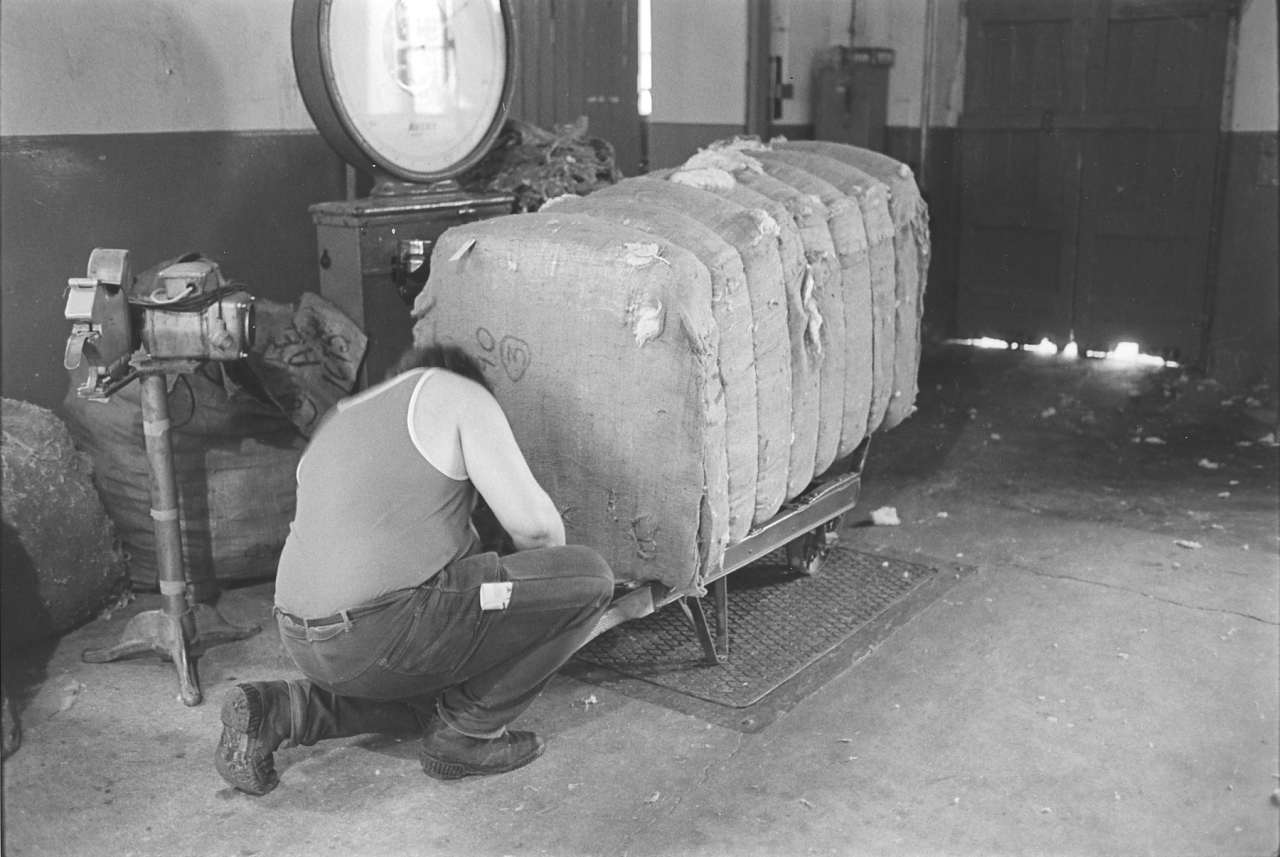
R/J- 8.01, It’s only .. can't say much about that.
R/C- Just weighing the bales again, cop bales, thread bales. And one important thing, if he to going to put it down, the idea is to cut them sometimes at the bottom.
Because it's safer.
R/C – No, cut it while he had it there, so that when he put it down he…
R/J – Cutting the tare, aye.
R/C - At one particular time when you wasn't allowed to cut a tare.
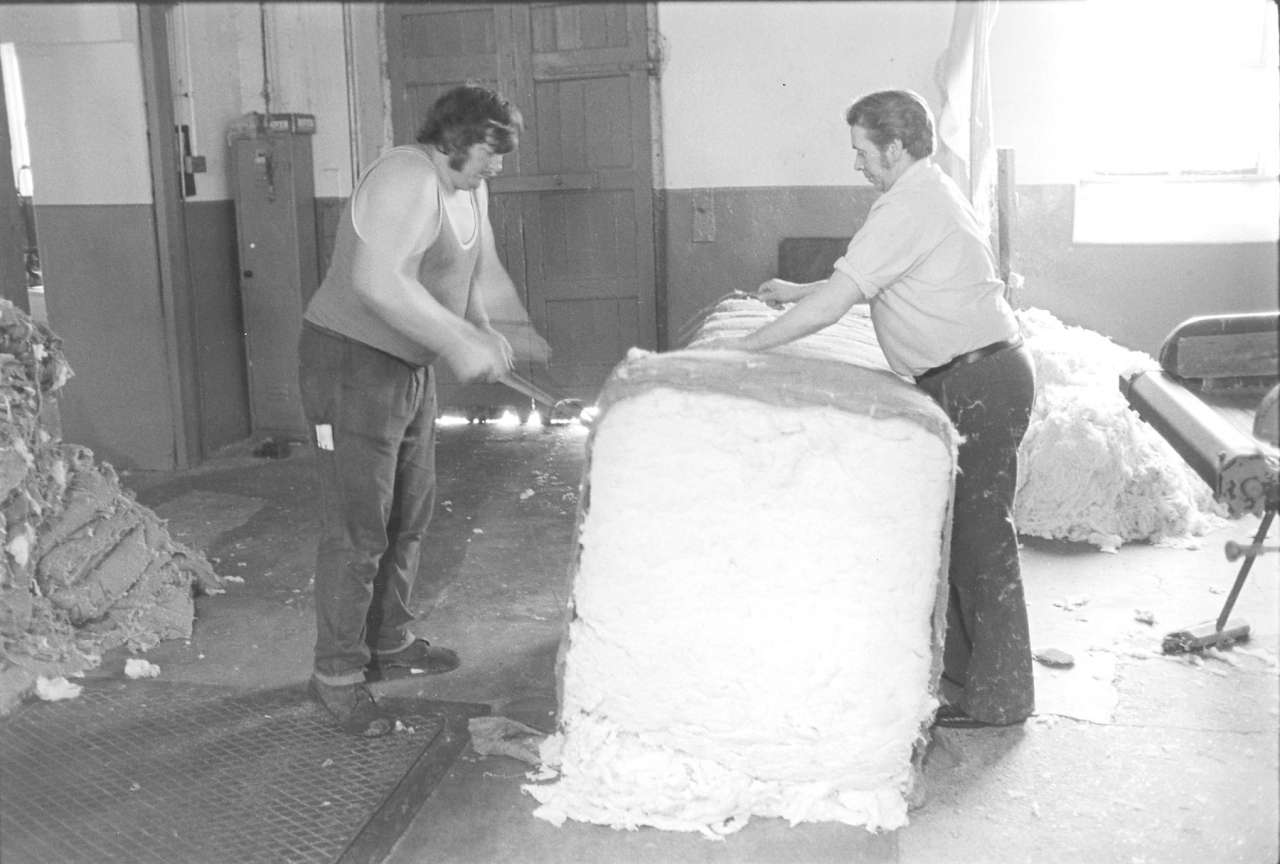
R/J- 8.02. There he is opening a bale, cutting the wires.
And his mate's holding the ...
R/C - Holding the wire to stop it flying all over.
R/J - To stop it springing.
Why did you say Charlie that at one time they weren't allowed to cut the tare off?
R/C - Because the suppliers of them tares, they all had to go back and when there are presses these tares fit the press. If you cut them you spoil the tare.
But now they are not used again.
R/C - They are not used again, they are all made of glass fibre material, they won’t accept them back a lot of them. [More likely to be polypropylene material than fibre glass]
Oh, there's still quite a lot of rope type [Jute] ones though isn't there? Not rope, kind of linen, calico, jute I don't know what it’s made out of. Sacking.
(450)
R/C- Trying to think... it's called hemp, yes.
Hemp. Because I've seen quite a few of these in the warehouse.
R/C – Yes. But there are firms who delight in getting hold of those, that sacking we might call it. 'Cause they break it all up and it’s used for some other process. So they'll take them any time. Right, 8.03 Joe.
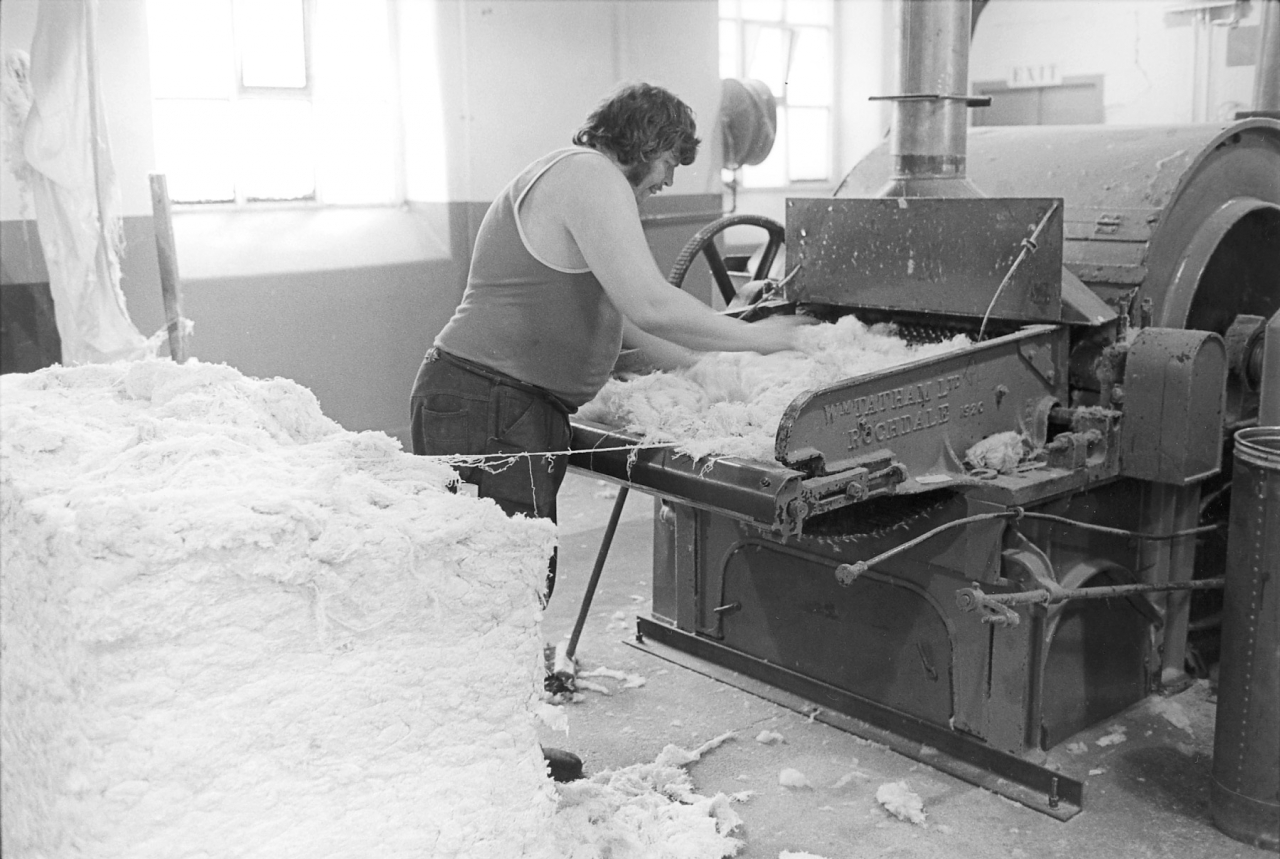
R/J- 8.03. This in Roland feeding the Jumbo, I call it the Jumbo.
Well that’s what I know it as but I knew it must have a proper name.
R/J- Some calls it a breaking up machine.
R/C- It were called the cop bottom…
R/J- Running down machine. I've heard all sorts of names but I call it the Jumbo. Now Roland just there is putting his normal feed on, which is too much to start with....
R/C- Which he always did.
R/J- As usual.
R/C- He used to overfeed it too much.
R/J- It’d only take so much at a time. If you had a tough piece of steak and you’re chewing it, if you put the lot in it takes ages to get shut of doesn't it?
Yes.
R/J- If you put a little bit on…
R/C- What they used to do at one time which it doesn't show, they used to, when they used to put it through in bale form, they used to put two or three bales down, and it were up to the operative to blend it, so much of it at a time on to the feed lattice to get the perfect blend, the different counts or twist.
R/J- But before that they used to buy cop bottoms in bags.
R/C - Yes they did.
R/J - And we used to empty all the bags and make a right big stack of it and then…
R/C – Yes. Same process.
R/J- ... put it through the Jumbo. They never bought any bale form like this, they were all in straw bags.
R/C- The only reason why it went on to bale forms is because people no longer had room to make large stacks.
R/J – That’s right.
R/C- .. they went out, cotton bins went out, people wanted that room.
R/J- Oh you should have come here then when we had cotton bins there ...
R/C – massive, oh they were a massive thing.
R/J - Horrible.
(500)(20 min)
So there is a maximum amount you can feed into that machine then?
R/J- Yes definitely.
And it’s got to be fairly level I suppose has it?
R/J – Yes, it’s got to be a normal feed, equal all the time. Aye, it comes off the back like a curtain, it comes off like curtaining at the back doesn't it?
R/C- It’s all shredded into thread. Spun thread.
R/J- Which we'll see on 8.04.
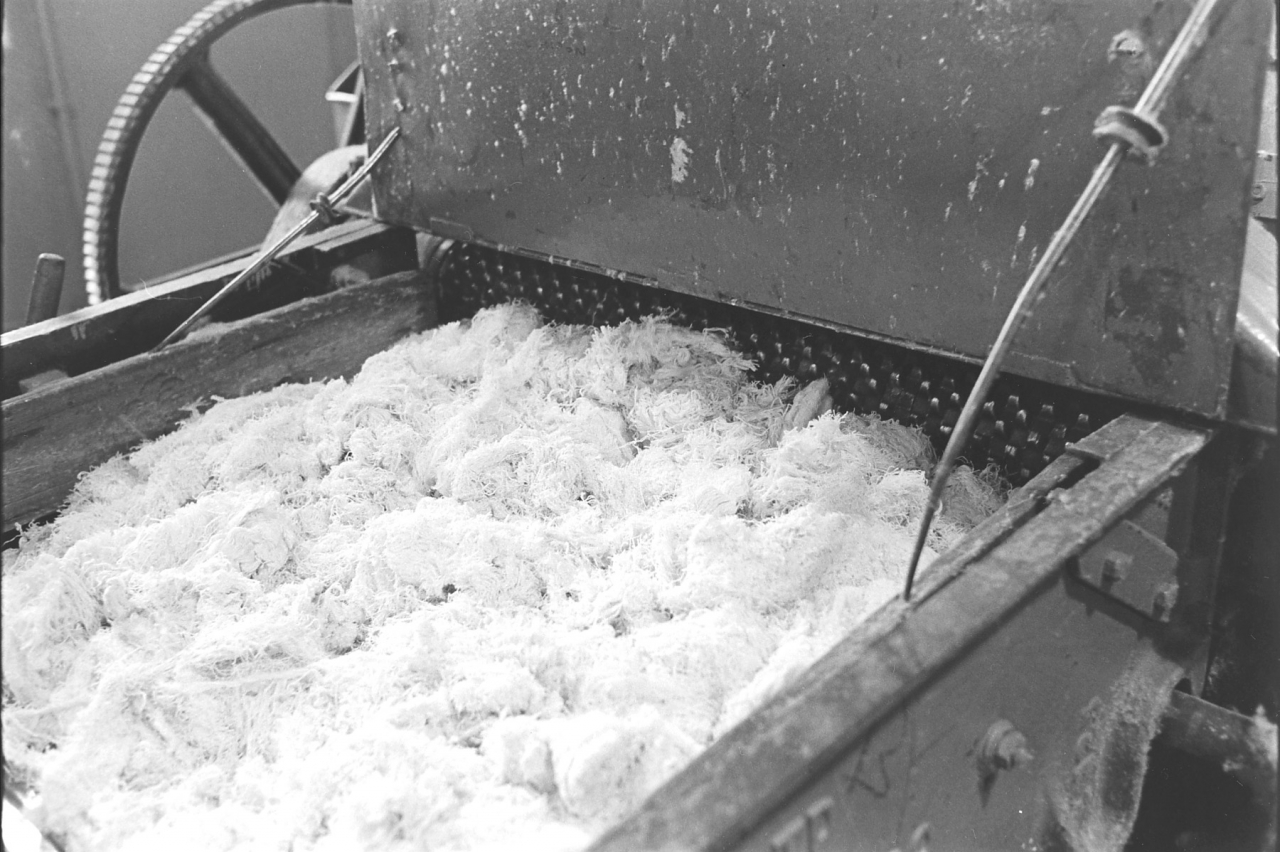
He knows what he's doing does Joe!
R/C - He does that.
R/J - That just shows the feed. Now that’s OK.
R/C- That's a proper feed.
R/J - It's a nice feed instead of the rollers taking it in.
R/C - I notice the guard, which should have been down, it should always really have been down, fastened down.
Oh I see yes.
R/J- This guard here should have been laid across.
These spikes presumably are holding it up.
R/C- No, they'd be the spinning spindles(?) they'd only be put up for the photograph.
Yea.
R/J- Now we’ll see the front.
R/C- Right. 8.05.
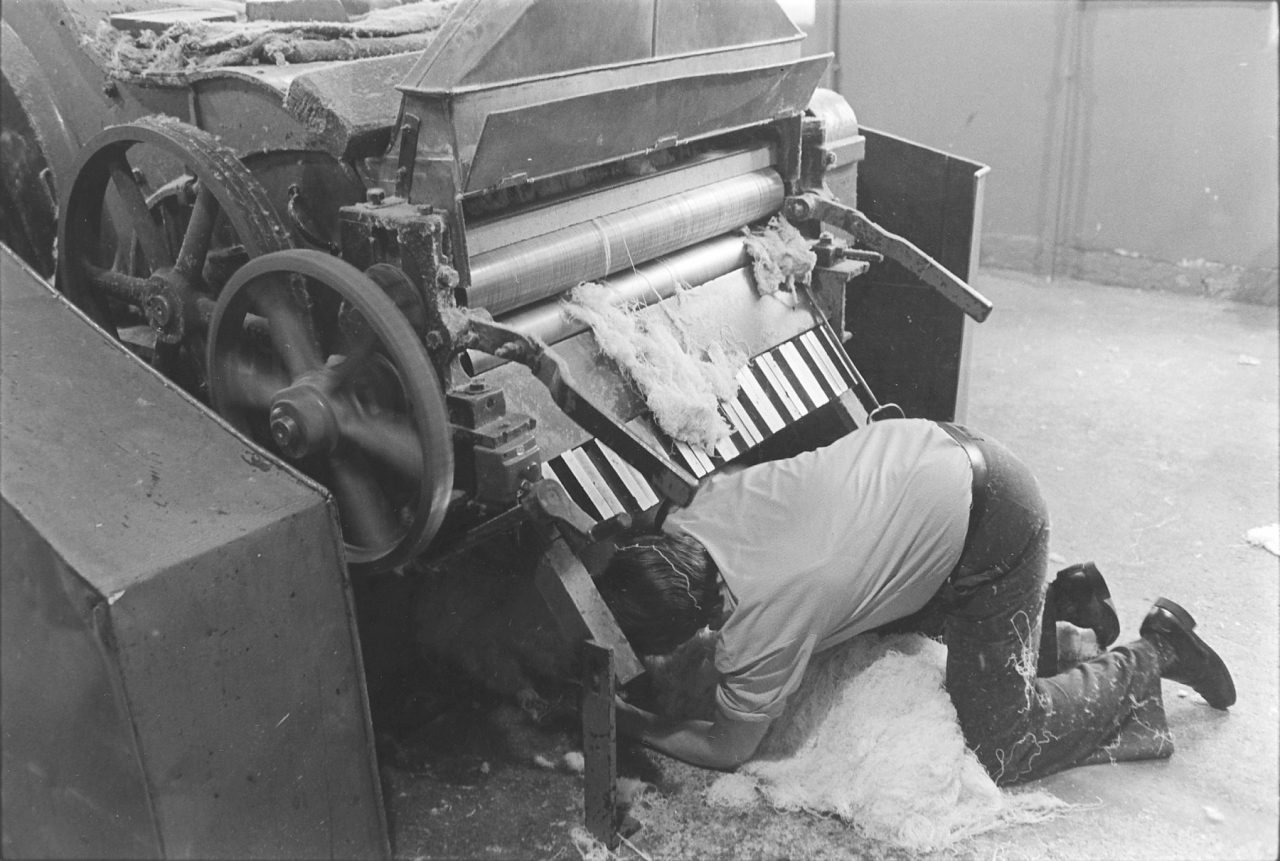
R/J- On 8.05, where Jim’s just cleaning up there, and this is the wheel that goes.
R/C- Not the one that broke.
R/J- That's the one that breaks. Now you can see, that used to split right in half.
R/C Tell ‘em about the magnets.
R/J- Aye. Them there is at the front. All those at the front there just over Jimmy's head, the magnets to pick …
R/C- Metal…
R/J- Any metals.
It always surprises me that it's at the front end and it isn’t at the feed end, the magnets.
R/C- We can't take it off at the feed end.
Well no you can't but it seems that all the metal that you do occasionally get in has got to go through the whole proceedings and cause what damage there is going to be.
R/J – Has got to go right through.
R/C- The only reason why it is done at the front end is because everything is so solid at the feed end [that the magnets can’t extract the metal] *
R/J – Oh, I see what you mean. It has to go through the machine to do damage if it’s there.
R/C- That's true, yes, always been so.
R/J- And then it's catched here when it's done the damage.
Does it catch everything or does some stuff manage to get through?
(550)
R/J- Oh it doesn’t catch a lot. It only catches small bits of metal but if a large bit come through it’d just go straight off, it’d wipe it straight off.
What sort of things do you get coming through?
R/J- Oh you get all sort of things coming through.
R/C- It’s really like metal bits off weavers pirn ends and that.
R/J- Ends of them and you get nails, razor blades…
R/C- Yes.
Razor blades?
R/J- Oh aye, Stanley knife blades, they use them in some places, well they sell their waste to us, and they will sling them in, we get them here.
R/C- Up to this stage from Lancashire loom weaving and automatic weaving there used to he quite a lot of scratching up combs.
R/J- Yes, we even found a woman’s purse, Alvin Lewis found it with her wage in. He gave it to Johnny and they found the woman that belonged it, her purse, money in it as well.
Good heavens!
R/J - Oh we get all sorts found, cigarette lighters, keys, all sorts. Mind you, they are not much good when they've been through. Shall we go on to 8.06 now? Now that's the way they chuck 'em out... that's 0K.
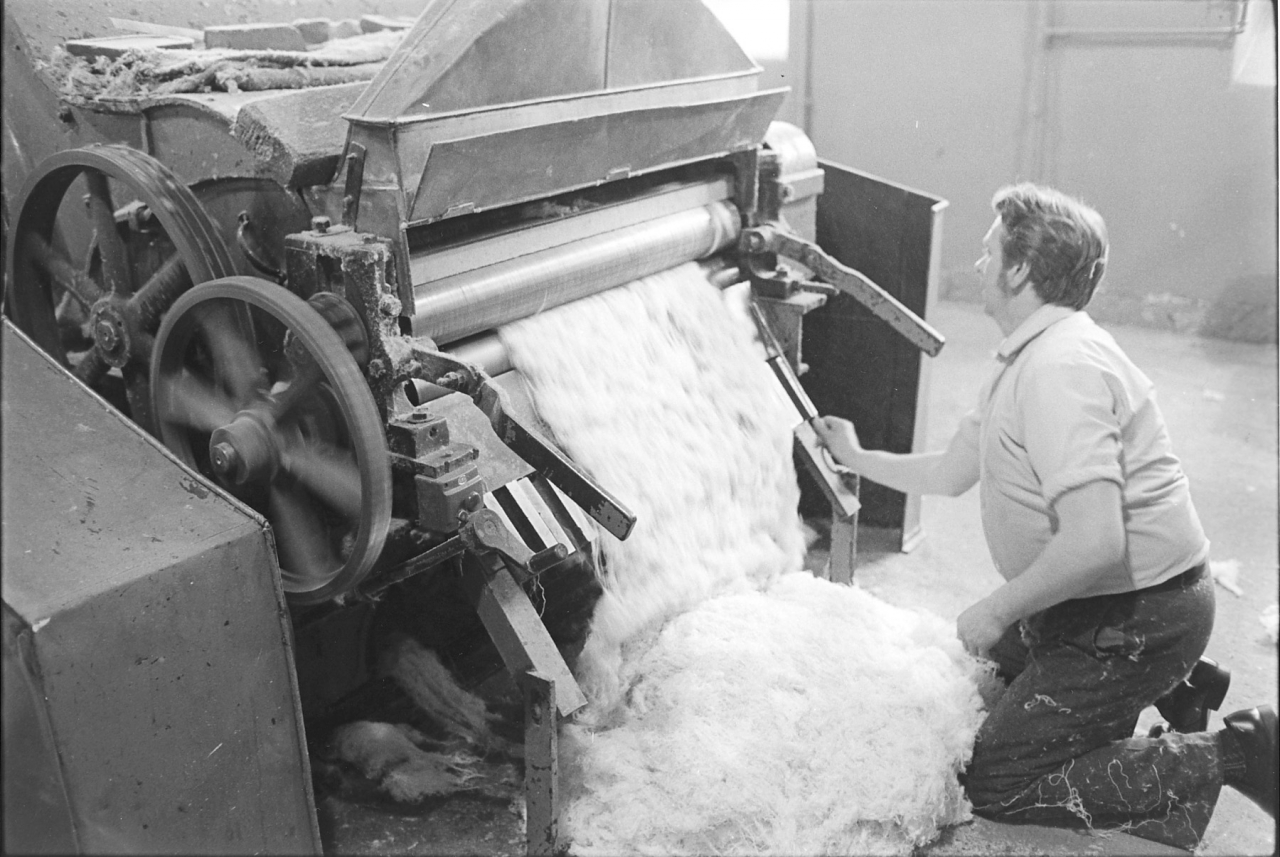
[8.06]
R/C - Beautiful throw. 8.07.
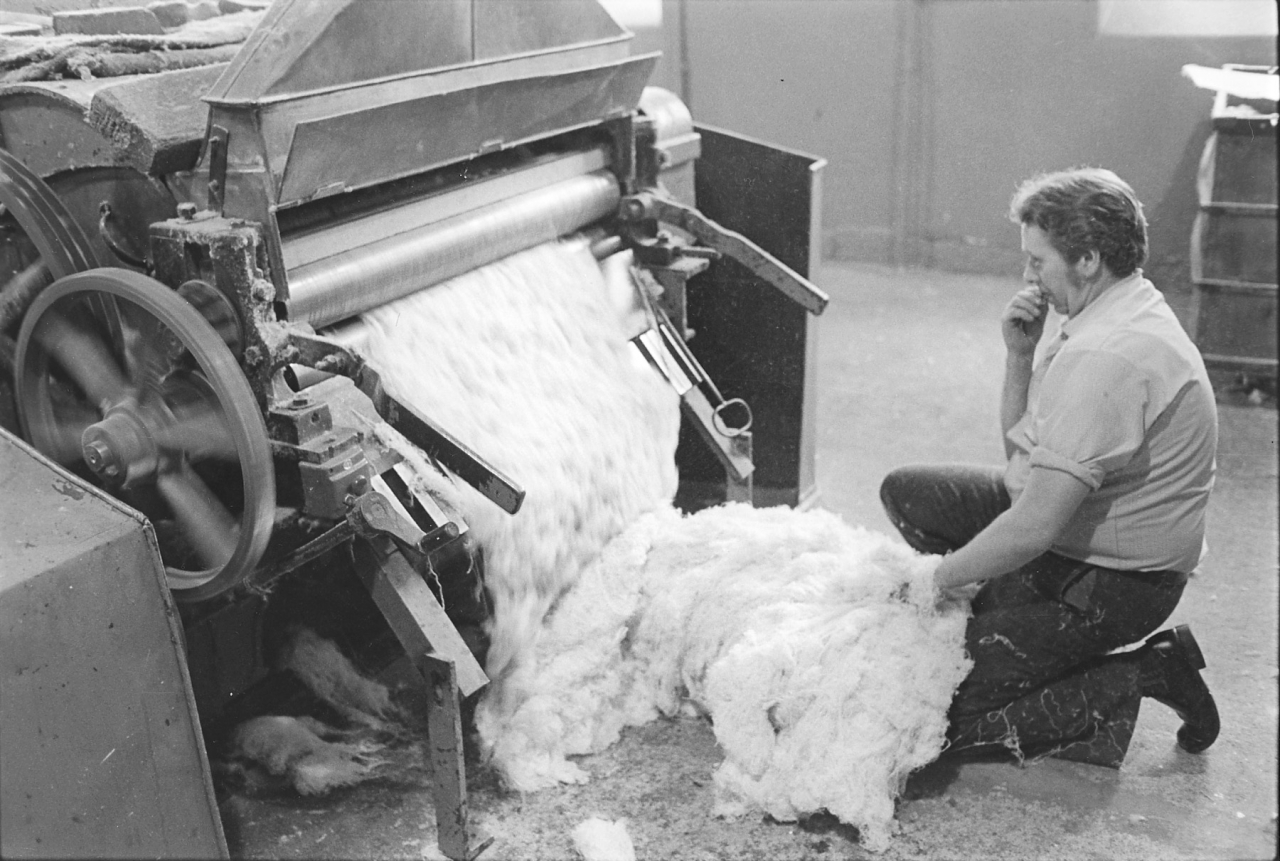
What’s always amazed me is that there's got to be so much hand moving of this stuff. It falls on to the floor.
R/J- Yes.
R/C - Always was dropped on to the floor.
R/J- That*s the old type, yes. It’s going to be dropped off, or picked up and carried.
R/C - Being an old type of machine there's no efficient means and there isn’t enough room for a lattice to carry it away. But it still needed a man at the front.
R/J - Still needs a man at the front and one at the back.
R/C - So old fashioned
What's this chap’s name?
R/C - Jim Quilton.
What was he doing .. on 8.06?
R/J - Well all he is doing now…
R/C - Making sure it’s coming out isn’t he?
R/J- He is on his knees here making sure it's coming out all right. Because if it gets stuck on to these rollers at the front, he has a piker in his hand there, he has that piker there and he just whips it out again.
R/C- Pulls it out..
R/J- ‘Cause that runs back ...
So it can go back round the drum, I see, like a mangle. Yes.
R/J - Yes. It runs back sometimes. Yes, it runs back.
This is the thing that when it's not operating it leaves on the magnet am I right?
(600)(25 min)
R/J- Them’s the magnets yes. See how it runs down on to the magnets? If there is a little bit of metal in there it'll pick it up, but if it's a fair size one it'll just go through. That's why we have fires in the devil hole.
Is it?
R/J- All metal, foreign bodies. He’s in great thought here isn’t he?
He’s what?
R/J - .. like he’s saying a prayer.
Or is he perhaps praying he’s not going to break down while the photograph's being taken?
R/J – It’s running OK.
R/C- Could be so yes.
R/J- Ah that’s the wheel that breaks.
R/C - Yes, that was the one, always breaking.
R/J- Yes. That’s the one.
What are these two metal supports that stick out?
R/J - Well that’s, if he presses on there he lifts this roller up at this side, so he can get his piker under and pull it through, thread it through.
R/C- It releases the width of the roller, yes.
Ok I am with you, yes. And if he pushed that down does the machine stop or does it keep going?
R/J- No, it keeps going.
R/C- When it does that you just lift them up, that's all.
R/J- Just lifts it up about an inch.
Yes, I am with you.
R/J- So he can get his piker in and thread it back through. See, Roland misses his feed, all that stops and it goes round the doffer at the front.
R/C- The big cylinder.
R/J- So he presses on here, gets his piker underneath and threads it back through.
R/C- Pulls it back through.
Very good.
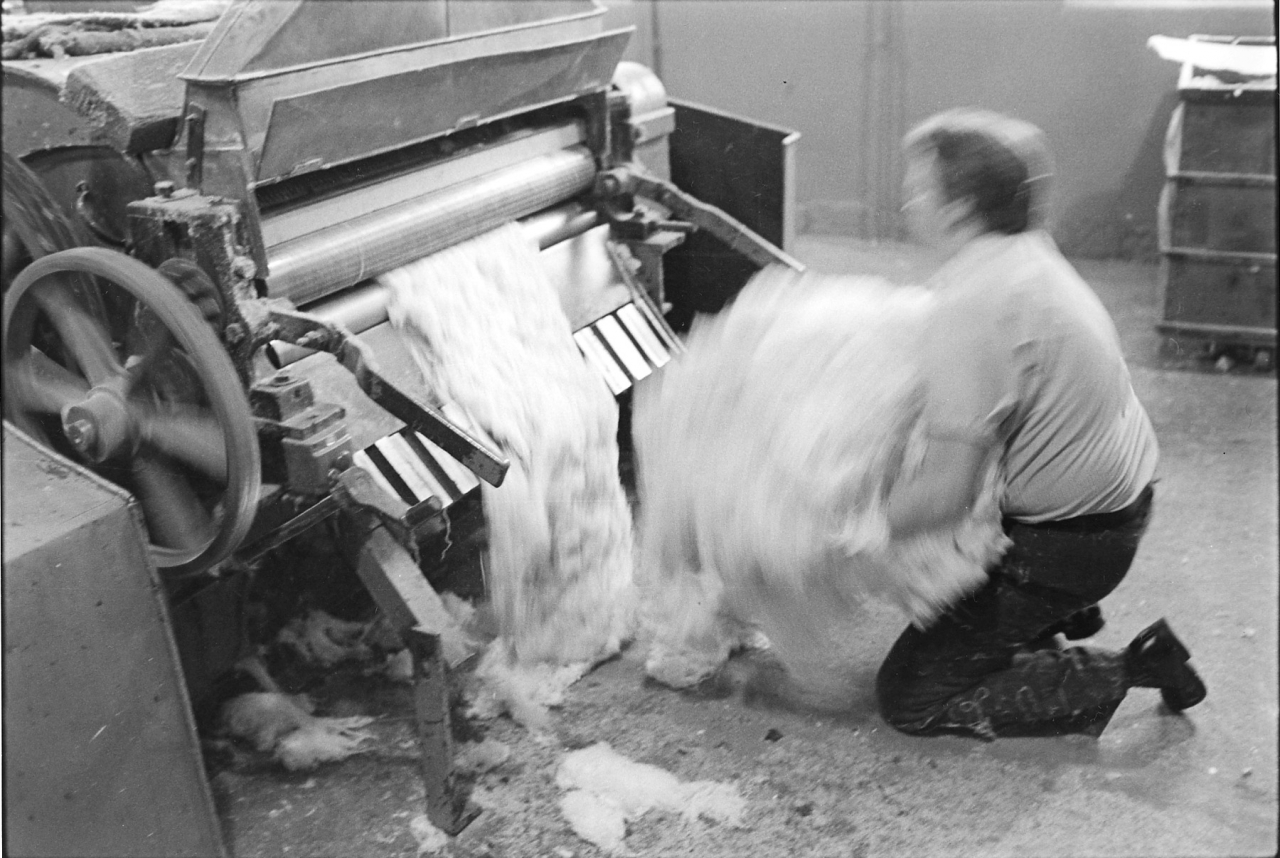
R/J- 8.08? And that shows you there where he’s gathering it up just to carry it away, and carries it away to the stack on the other side of the Jumbo.
R/C- 8.09 he carries it away.
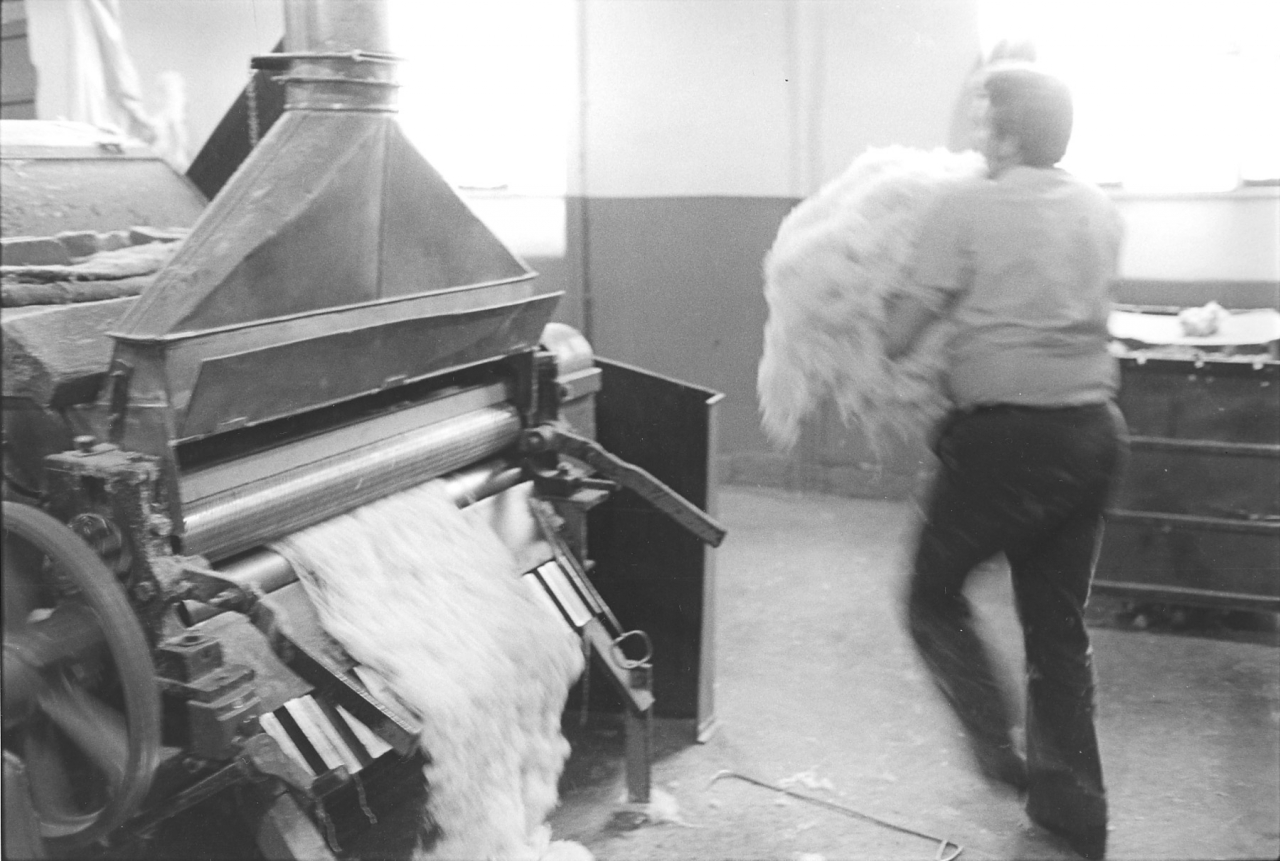
8.09, yes. That’s a funny thing as well. The fact that he has got to actually pick it up and carry it round to the back of the machine to the feed end of the machine, because the stack’s down that end isn’t it.
R/C- Yes that's true . Correct.
R/j- And the stack’s for the devil hole.
R/C- Once of a day, where there were these storied mills and they had this upstairs they'd have a hole in the floor into a cotton bin, a stacking bin.
(650)
R/J - Just drop it down.
R/C - Just dropped it down.
Well that's what happens here isn't it?
R/C- Yes, but it has to be carried to do it.
Oh I see, of course.
R/J- It has to he carried, stacked, and then handled again to throw it down the chute.
Oh so when you say ‘being stacked’ you mean it is put in a…
R/C- In a stack.
R/J- It’s put in a stack at the side of the wall here.
R/C- Separately again down the chute.
R/J- And then it's to be thrown down the chute. Yes.
Yes because if you kept throwing it down the chute they'd get too much down in the devil hole.
R/J- It’d fill up.
R/C – They’ve no facilities below for big stacks.
R/J- That’s because it comes to fire risk from where it goes down.
R/C- It has a dust extractor on.
R/J- Yes well that's what them pikes were. This is the dust extractor at the front and there's one at the back and it takes all the dust away. Not too bad.
So there were two dust extractors on the Jumbo were there?
R/J- Yes one in the front and one in the back.
Oh I see. Yes I am with you. Very good.
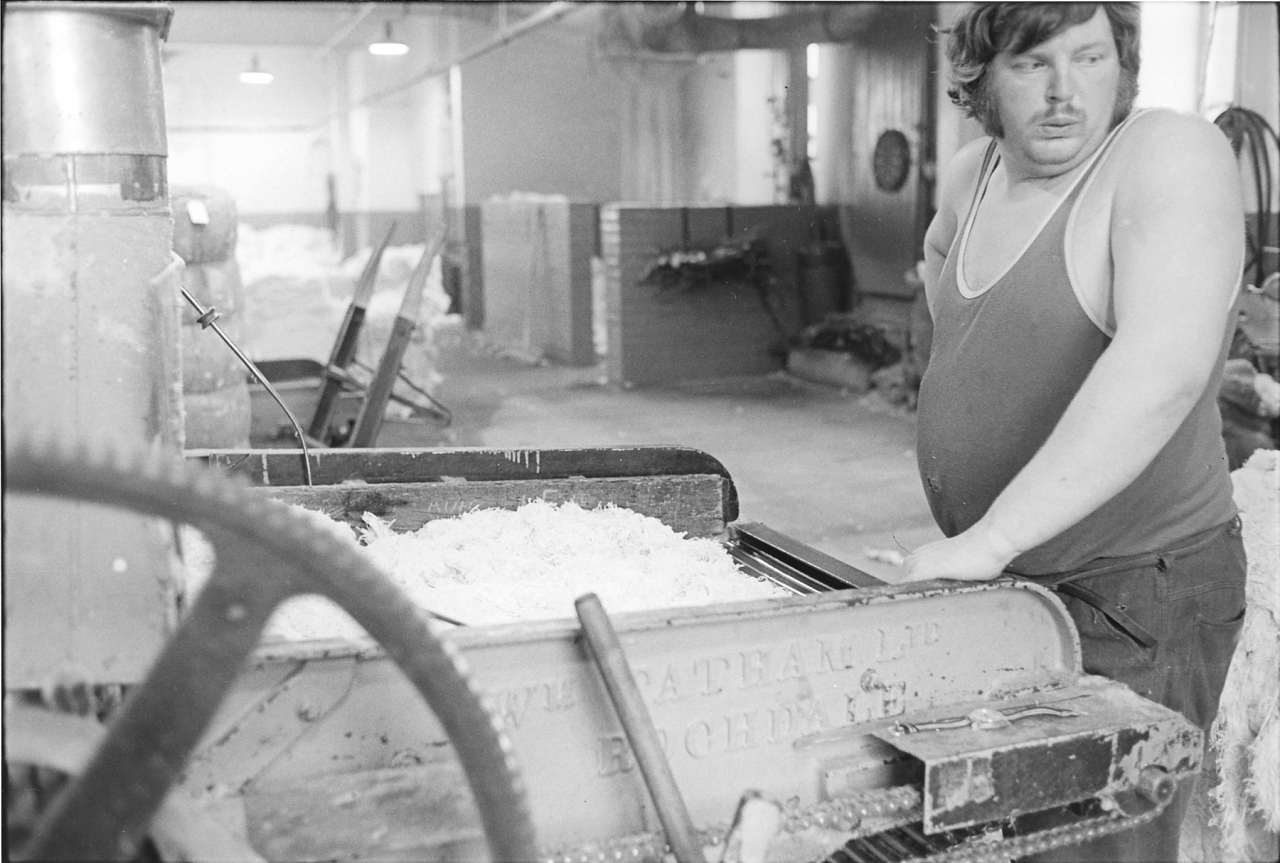
[8.10]
R/J- Next on, 8.10. Now there is the dust extractor at the back.
Yes. Now then, you’ve got the makers of the machine.
R/C - There is the name on it.
R/J- Yes, Tatham’s.
R/C- Probably made, I don't know what the date is. Probably made before the first world war. They had a trick in the trade when they had old machinery, if they found a machine being scrapped with a nameplate on with a date, a later date, they'd put it on the machine to make it appear it was made later.
R/J- See there's Tatham’s Limited and Tatham’s and Company.
R/C - That's correct.
R/J - Now when they were when they were ...
R/C -Tatham were a private company when they went ...
Yes, when were that ?
R/C- I don't know when they went public.
So if it says Tatham and Company it's an older than Tatham Limited.
R/J- It'll be older but literally this is Tatham Limited.
R/C- Yes, I dare say that machine was actually made before the first world war.
R/J – 1923 I’ll say.
You reckon 1923 and Charlie reckons before…
R/J- I’m going off the devils.
R/C- Yes, there were a lot of that date changing in this industry.
That's interesting.
R/C - You'll find machines in the card room have had a fresh part put on with the date, which they are interchangeable .. Which actually doesn't belong to the card because you can tell when the card’s been built and you knew they were 1910 yet they carried a 1925 plate.
(700)(30 min)
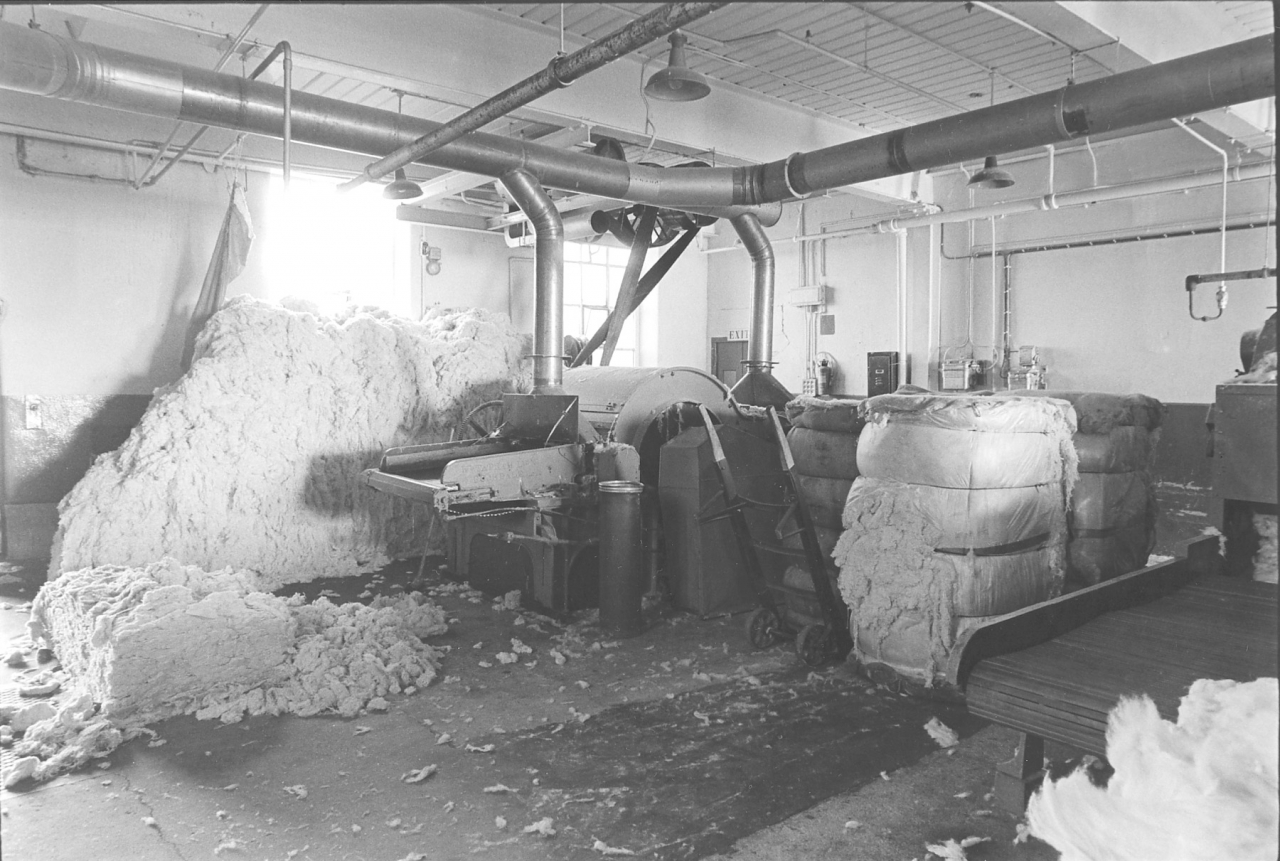
[8.11]
R/J - So we are going on 8.11 now are we?
Yes we could.
R/J - And this is where the mixing comes in.
It's strictly I guess really out of order because we should go from 8.10 down to the devil room shouldn't we? Because it, it goes ...
R/J - Because it goes on there from the Jumbo.
Yes, but anyway. 8.11 is showing the blending machines is it?
R/C - Start of the blending process.
R/J - Yes they put about twenty odd bales round, won't they?
R/C - There are more there’s twenty and more than twenty bales round four machines. It’s a process where whereby you can make a very cheap mixing.
R/J- That's what it’s for.
R/C- The more bales you put round, the more they can pass a poor quality bale in, to bring the price down.
Right.
R/J - And that’s the idea of, of all these bales.
R/J- You can see the start now of what Jim's built there off the Jumbo and all the dust extractors. Now when that chute gets empty, what we call the chute, he used to come in again and take it off that stack which is already built and put it down again.
He builds it up by hand as there is nothing to make that shape, is there?
R/J- No, he just throws it up.
R/C- And it's just a gravity feed down the chute. And every time it's empty he has to come again and put it up.
R/J- Handling it again isn’t it..
R/C- They’ve no automation at all there.
Do you think those dust extractors are efficient?
R/C - No.
R/J- They are at the back but they are not at the front. And they're not as efficient as they are on the bale breaker, at the mixing are they? It’s full of dust.
What do you call the bale breakers?
R/J- It’s these mixing hoppers.
R/C- In the mixing plant they're all bale breaking machines. They are called bale breakers.
Oh the blending. The ones next to the Jumbo.
R/C- That’s correct yes.
Four of them are there? Four yes.
R/C- There’s four of them.
R/J - Four of them.
A lot of fluff around.
R/J- That’s where it's dirty in there, it's a dirty room.
R/C- It’s a very dirty job is this.
(750)
R/C- When you go into a modern mill you won’t find anything like that, you won’t find anybody in attendance, it's all done automatic. They just put these bales in, as many as they require, probably 21 on three machines, and that's it. They close the door and lock it.
R/J- Yes all they do is take the wires and tares off and shove them on.
Doesn’t make such an interesting photograph though would it?
R/J- No it wouldn't. Right, 8.12.
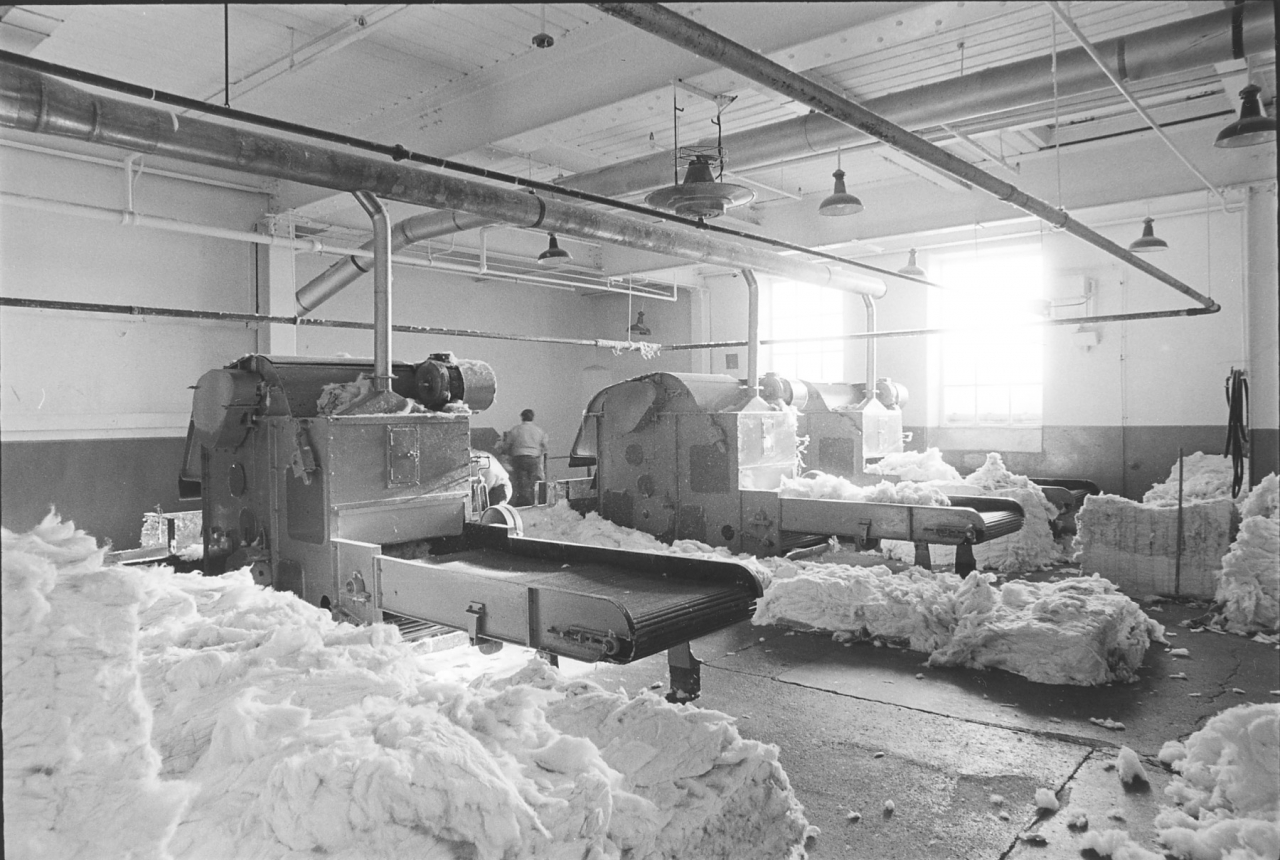
R/C- It makes an interesting photograph. If you've got that and you've got the old there.
Well, we'll have to think about that after I've gone another twenty years.
R/C- It was, you know, today and yesterday.
R/J - Now we've come to the proper photograph of the mixing machines.
It looks all very nice and clean and airy I think, that photograph.
R/J - It does but it tells a lie.
R/C - It doesn't tell a true story.
R/J- It tells a lie. When the sun's coming through them windows and you are at the top of them steps you could see it all in the air, long fibres aren't they, floating about
Has it ever bothered you two?
R/J- Not up to now.
R/C- I think all of us that have been in this all our working lives up to the present day, we must be full of dust but it hasn't affected us.
R/J- I’ve either digested it .. I think that’s what we’ve done, we ate it.
R/C- Yes.
Do you know what the current trend is for an increase in roughage in dietary fibre in our diet?
R/C - Aye we got enough fibre no doubt.
Yes, you've obviously done that already.
R/C- So, what do you call it? Roughage? We’ve had it.
Yes, for a couple of hours after I’ve left here particularly if I've been in the devil room or upstairs. Sort of…
R/C- Dry in your throat ..
Yes, at the back of my throat, feel I want to suck a sweet.
R/C- Now when we have a holiday and we come back that affects us the first morning.
R/J- I must say it does.
R/C - I were always told when I started in the card room, blowing room, to always drink pints and pints of water.
It's true yes.
R/C- Tea drinking.
R/J- We don't drink water though do we?
R/C- Not now.
I shan't ask what you drink. So it’s all right.
R/J- It looks a nice, clean room there but it isn’t, we know that.
Who decides what sort of mixing they put on these machines?
R/C - The office.
The office.
R/C- The office make out ... they do a…
R/J - They do a costing.
R/C - Costing yes.
R/J- What they add.
R/C- Cost. Very important is that fact.
R/J- They’ll put a few fair good bales down, but they'd put a lot of second class bales down. And when it's all mixed together…
R/C- I should say that.... with us being the waste industry a it’d be more percentage to the bad for our benefits than to the good.
R/J- If we get a bad mixing we have a lot of work in here and in the card room.
(800)(35 min)
R/C- Yes, it means lots of work for everybody.
R/J- It runs bad, things want altering.
R/C- Everybody's upset ... things you can't do to help it ...
So you then have to instruct that operative to… I mean, how do you guess how much you're taking off each bale?
R/C - Unfortunately it's all done by any operative you can get. It's never been classed as a skilled job, that's been the unfortunate part of it.
And yet…
R/C - Anybody who's walking past they'd employ to that job because it's so low pay and such a dirty job.
R?J- This job in the mixing plant, in my opinion, get a conscientious man and he should be paid because that’s where it all starts.
R/C- yes, they should have been paid.
I was just going to say, from what you two are both saying it seems as if that, really, is the hub of the whole thing.
R/C- That is everything.
R/J- Yes, where it all starts. It is this bloke up here feeding this machine. If he doesn't keep them all level .. these twenty bales there have all got to be level all the time and then they are all going in even.
R/C- Must all go down even.
R/J- Well you see some .. he's plenty of stuff on this lot here and he's nowt there. Well that show he is mixing it badly, he is putting in more of that in than this you see?
How do you say, the mixing, how is it described? So you’ve got, what did you say you have? About five or six bales alongside the machine? So what do you say to the chap, how do you describe then what you want?
R/J- Well, all he has to do is keep them even.
R/C - Let them go down even...
This is as straightforward as that is it?
R/C- Yes that’s all it is.
R/J- Yes. As long as he keeps them even as they go down. It’s no good putting two bales in and having four that’s never been touched, because that isn't a mixing, he's only mixed two bales. 'Cause they are not all alike.
No I appreciate that. So to do it really properly you take as much off each bale as the others.
R/C – Correct. The same amount, yes.
R/J - As possible.
And so to feed one lot through that…
R/J- Yes through one machine.
So you really take a fifth of each, or sixth if you’ve got six bales to feed through, you should be mixing it every time you put a, sort of a lattice full through.
R/J- Yes. That's right.
R/C - It is one .. there is one good thing about this way, that it's not the end of the blend.
No.
R/C – It’s just the start of it. There is a ...
R/J- It's the beginning.
R/C- There’s a good opportunity later on where it shows the improvement of it, of the blend.
(850)
Yes. Do you call these blending machines?
R/J- Yes.
R/C- Yes.
Each blending machine is then mixed with the next one because you've got a feed at the end haven't you where all four mix into…
R/J – Yes, they all four meet and goes into a press.
R/C - All these are individually fed and they have an individual stack of bales to each machine.
But at the front end it's all mixed together isn’t it?
R/J- It's all mixed on a long lattice at the front ...
Yes which we, you'll see later on I think, yes.
R/J- We’ll come later on.
8.13.
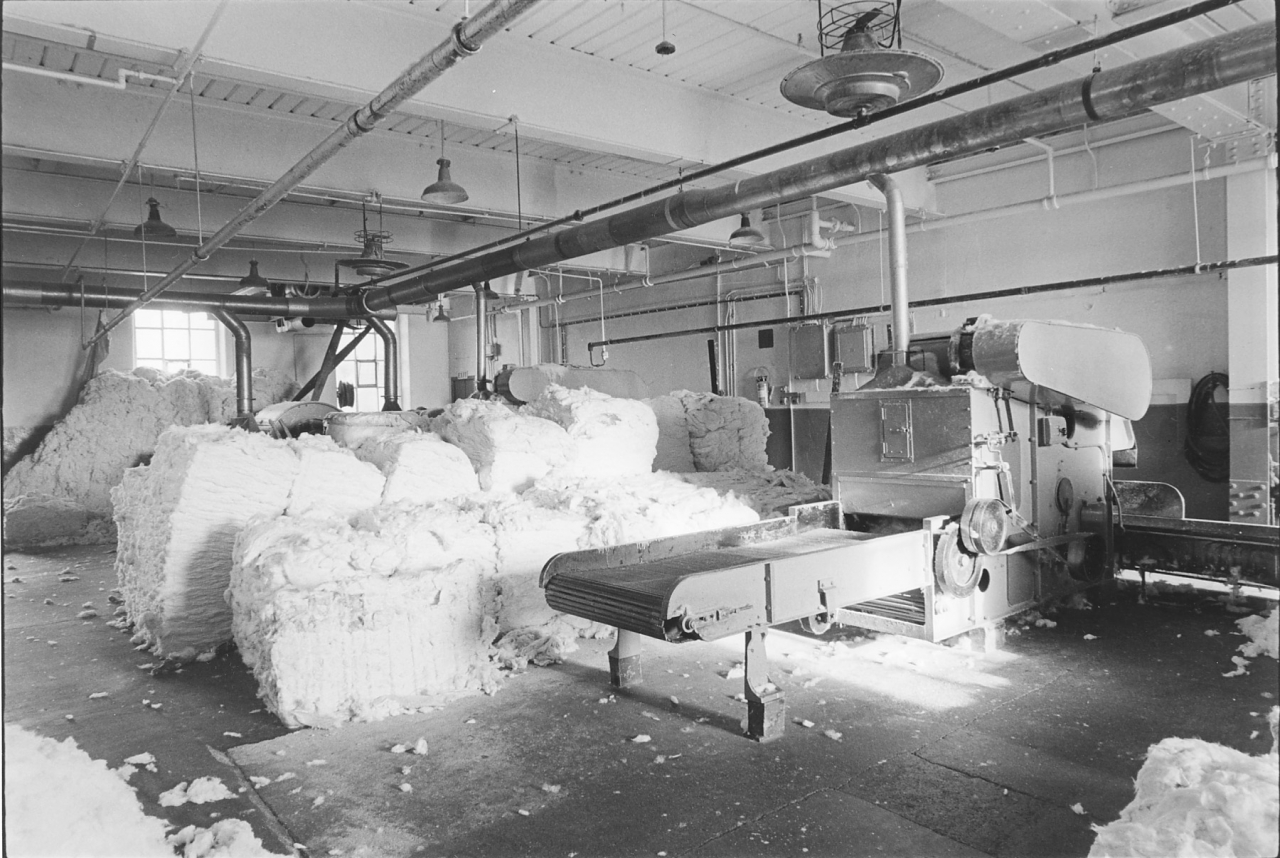
R/J- Well that just shows you the same one on it’s own
R/C - That shows you the same principle but just behind one.
Is there six bales there?
R/J - There is eight bales there.
Eight. It's not very good looking, it's upside down.
R/J – Yes. There is eight bales.
Yes there is, I can see that now.
R/J- Now there's a, aye but that eight bales are between two blending machines. It's another one here, so there’d be them then eight or twelve bales'll be mixing in them two machines would they?
R/C- Possibly they'll be put down for two, between two machines.
R/J- Yes. They are here. And then they have so many for this machine and so many for that machine and they are all different sorts. You get Russian, you get Japanese and …
R/C - Now that's an important thing what George just said. This cotton comes from all over the world, it’s not just from English mills, and it's all waste material ...
R/J - Not all American. It's all been used before.
R/C – Yes, it has been processed.
R/J - It's all been used before hasn’t it.
R/C – It’s what you might call a sub-standard cotton but it's ideal for the purpose what they wanted it for.
Do you think there in an equivalent of this sort of mill in other countries? Or is Britain the only place where they've got a cotton waste industry?
(40 min)
R/C - No they all have them, they've all had a waste industry but not on the same scale as there’s been in Lancashire.
Right yes.
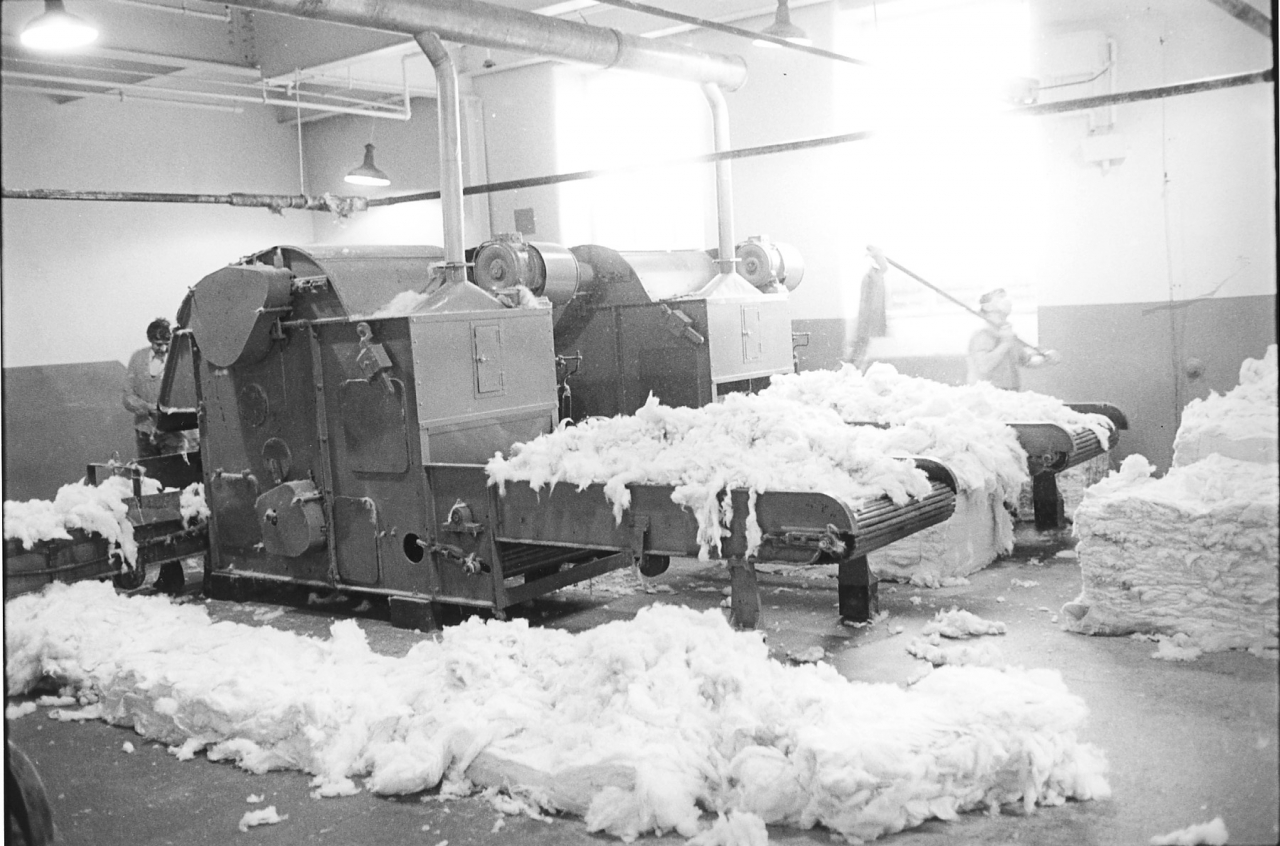
R/J – 8.14. I say there it is an example, there. He’s nearly finished these bales and yet he's all this yet.
R/C - You see there are some times when you say “There is only a bit left” Well it might have been penny pinching, telling them only to use half.
(900)
R/J- Yes they might be the best bales.
R/C – Yes, see, and save half for the next mixing.
Yes I am with you. So these…
R/C - A lot of that done.
.. so these low ones might be the best.
RC- Yes. See they wouldn't mind if you put two lots of cheap uns in.
No. Something I noticed when I was looking through them is that a lot of the window cills don’t have a cill, it’s a slope at the bottom.
R/C – That’s to stop people putting stuff on them, cluttering them up.
For what reason?
R/C - So that, the window cills in a cotton mill of our type of mill have always been places for people to shove something on, so they've decided to slope them so they’d always be clear. I've never had anything there, you couldn't hang anything there, or put anything on there. {in the old mills the slope was also to stop operatives sitting down on the job.]
And is that to always make sure that you've got maximum light coming in?
R/C - A maximum light, and it gives it a better appearance when it's all cleaned up.
That's always been a fairly important aspect of the cotton industry hasn’t it, the place looking clean?
R/J- Looking clean at week end.
Yes because in the very early days when they were still working on Sundays .. here I'm going back into the eighteen hundreds ... There was quite a lot of time given for cleaning up, wasn't there?
R/C - That's correct
In fact I think Sunday was the day they had to work say, four hours or just the morning or something, on cleaning up.
R/C - Correct.
Now, what's the chap doing here on 8.14?
R/J- That looks like he is just cleaning the tops off; looks like he’s just knocking the dust off the pipes.
Is that a long pole with some sort of sacking on?
R/J – Exactly. That’s what we call a dasher.
A dasher.
R/J- Yes.
R/C - They call them dashers.
R/J - Don't we? I wonder why they call them dashers.
R/C - Dash the waste off they call them.
R/J - Keeps swinging about like that and knock all the dust down so he'll have a mask on. Yes, he'll have a mask on. It looks like now they're stopped now and he’s cleaning.
Oh I see. And is that, they call it in the spinning room as well, because they go down the alleys like that?
R/C - They dash off.
R/J- Yes. That's what they call dash off isn’t it. With a piece of rag.
Dash off. Some lovely expressions aren't there?
R/J- Here we see again the Jumbo.
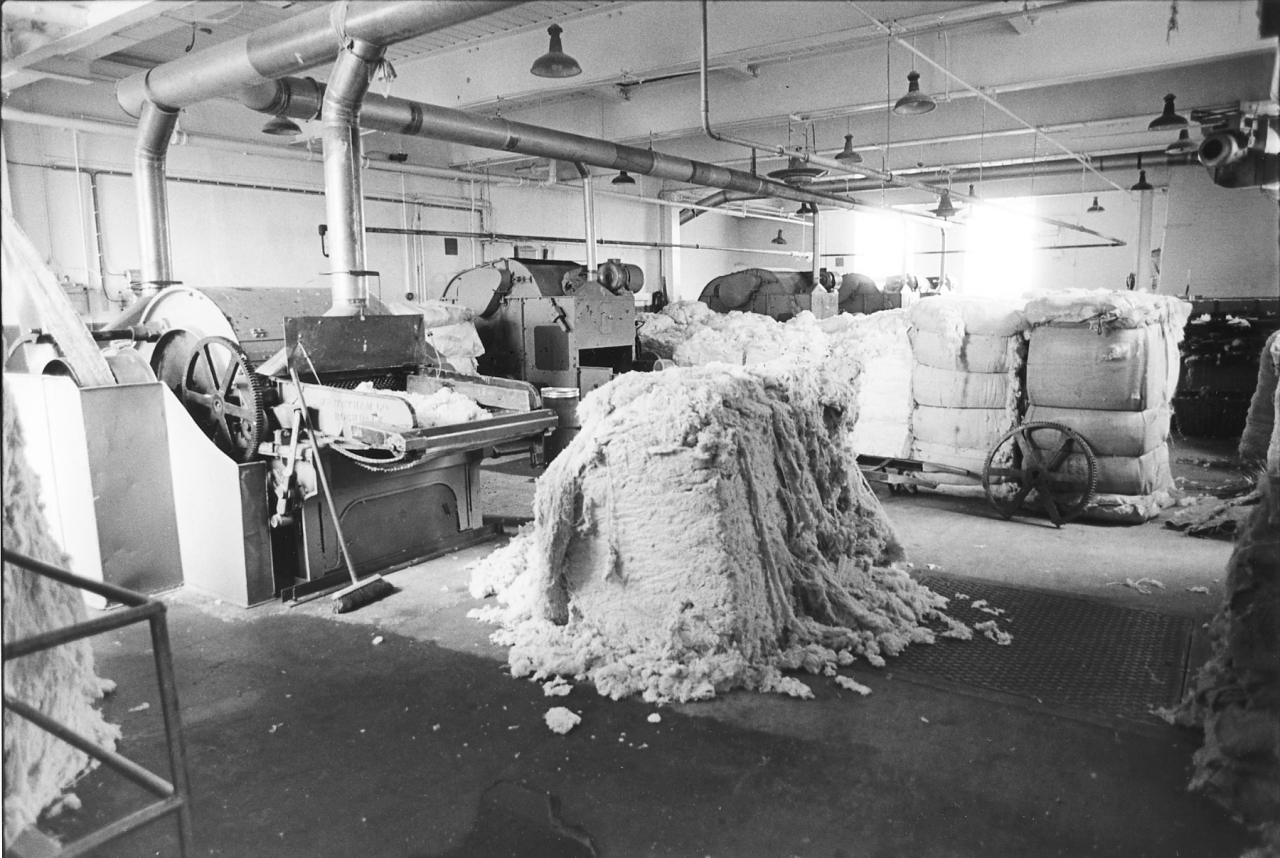
R/C- On number 9.
Just before we go on to number 9, did the lights always have to be on? Or do you have times when they don't need to be on?
R/C- We have times, but it’s got to be very light. Like today we’d have them on. We'd have to put them on today; although the windows are there it doesn't catch it so well. There is no windows at this side and no windows at that side. Windows at the top and here.
Yes. We are on number 9 then now.
R/C- I think the reason why on these, all these, 8.14 all those, that they are so dark, because the plants were put in existing rooms whereas today the rooms are made for the plant.
R/J - Aye they are. It's an old building.
R/C- Probably it was a store room or even a spinning room.
Good point. Yes.
(950)
R/J- You see, in this room, all that were in that room were a scutcher that ran coloured laps and the Jumbo were the other way round. That Jumbo were the other way around. We used to put the stack here, but it only had that machine, none of theme were in then.
That was before it was electrified was it?
R/J- Yes that were when it were running on the engine and then these came along.
So these blending machines haven't always been needed or used in the blending process?
R/J- No. They had one of them machines in the top room. 'Cause each mill made their own mixing, didn't they? They had their own devils.(
45 min)
R/C- Why they put these blending machines in, you’ve just said. They had all these different spinning mills, they had three and they all did their own processing, their own blending. So it’d come to such a time where they decided it were more efficient and cheaper to blend at one mill.
R/J - That's right.
R/C- And put the proper blending machines in. So they’d all have the came blend 'cause they were selling the same yarn was going back to the pair of mills to weave. So before, when they was blending differently, there’d be a difference in shade. And that took control of these other people at the other mills. Where they could have made the mixing better for spinning but the shade would have been different. So they'd worked all this for all this, for all the ranging and everything, for the finished product, that’s why they did it.
R/J- Well, Higher Mill had a Jumbo, they all had their own devils, Holme Spring had a Jumbo and three rows of devils and we had three rows of devils and a Jumbo which we still have ...
R/C- They all had, every little mill had…
R/J- But then they all got these come in and did away with a deviller at each mill and a bloke that mixes it for each mill. Didn’t they? Did away with them two jobs.
R/C- They saved a lot of space in these other mills where they used to have to store their own materials. See when they did this blending system, for the first time they had proper control over it.
R/J – Yes, it were a good idea at the time because the wagons had to go round, deliver at Holme Spring, deliver at Higher Mill, deliver here…
R/C- It were a very good move that
R/J- Very good move.
R/C - Without any doubt.
R/J- It’s really not a bad set up, but for the dust, I should think we'll see the lattice on number…
Have you finished with number 9?
R/J - Done number 9 have we? Yes.
R/C- I think so.
R/J- Number 9’s similar to 8.14.
Yes, OK. Number 10.
(1000)
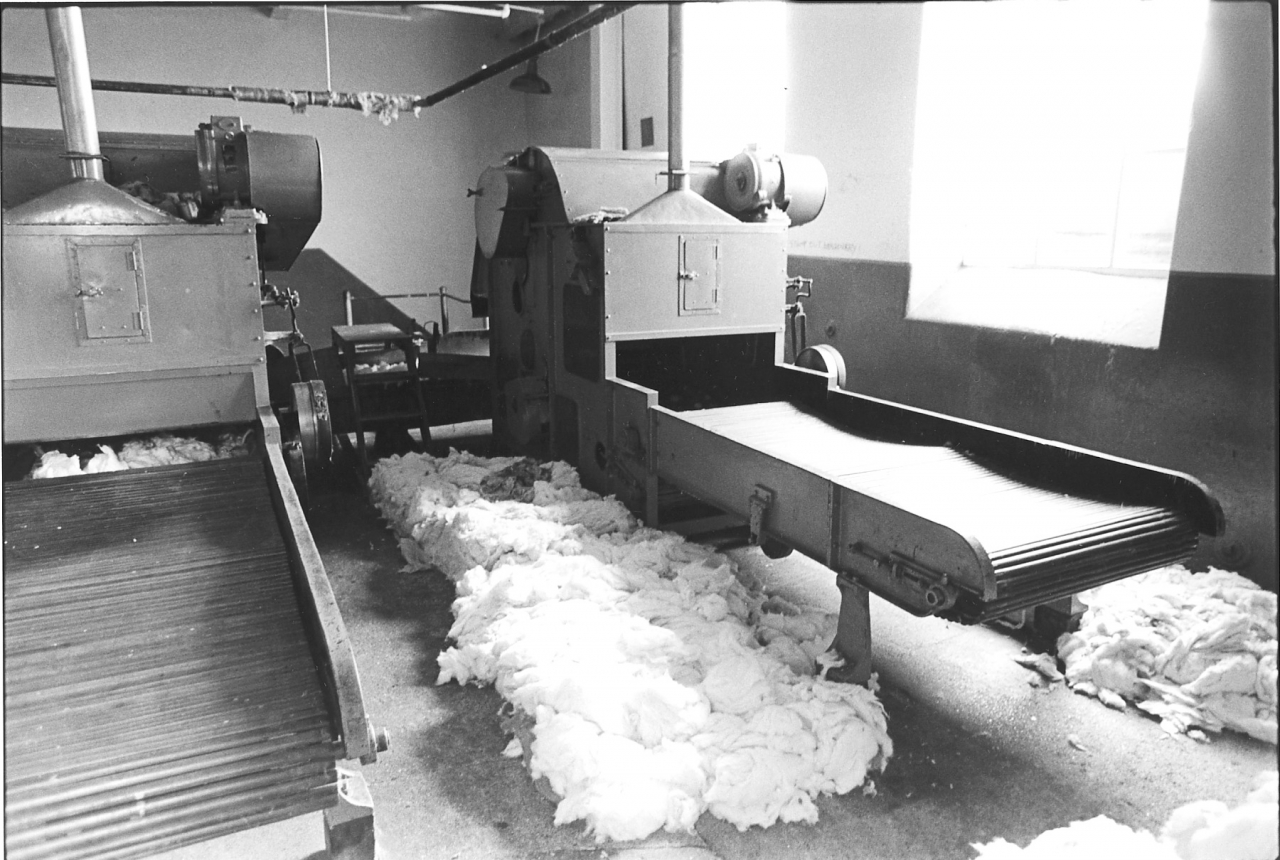
R/J- Number 10.
Now that does look clean and tidy.
R/J- Ah well, you must come round on a Friday when they have all been cleaned up. You can’t see a bit of dust, they were good cleaners them two lads and they had plenty of time for it. That shows the end of the room where it looks grey.
They are not running now those machines are they? They haven’t been running for a while, have they?
R/J- Brian’s just running them this afternoon, just getting a few off, he’s took my job.
And that's all my fault, is it? Because I’m here?
R/J- Yes.
R/C- He likes it.
Dear dear, I am in bother today aren’t I? Yes. So he's got all the bales run down here, on number 10 isn’t it.
R/J- Now that’s OK you see. You can see they’re all even on here.
All even yes.
R/J- Now that, he’s mixed them all very well on that machine.
So he can have a Brownie point.
R/J- Yes.
R/C- It is the sort of job where whoever's employed on that should always wear a mask by rights.
Yes, there's no weight to this stuff is there? I mean this for the Jumbo, it’s heavier stuff isn’t it?
R/J- Yes it is.
R/C- There is no working danger anyhow on these hoppers because all you're doing is feed them and the dust control is very efficient.
R/J- It's not heavy work although they shift a lot of weight through in a day.
R/C- But they have, they were a very efficient means and the hoppers are very good.
Picture 0011
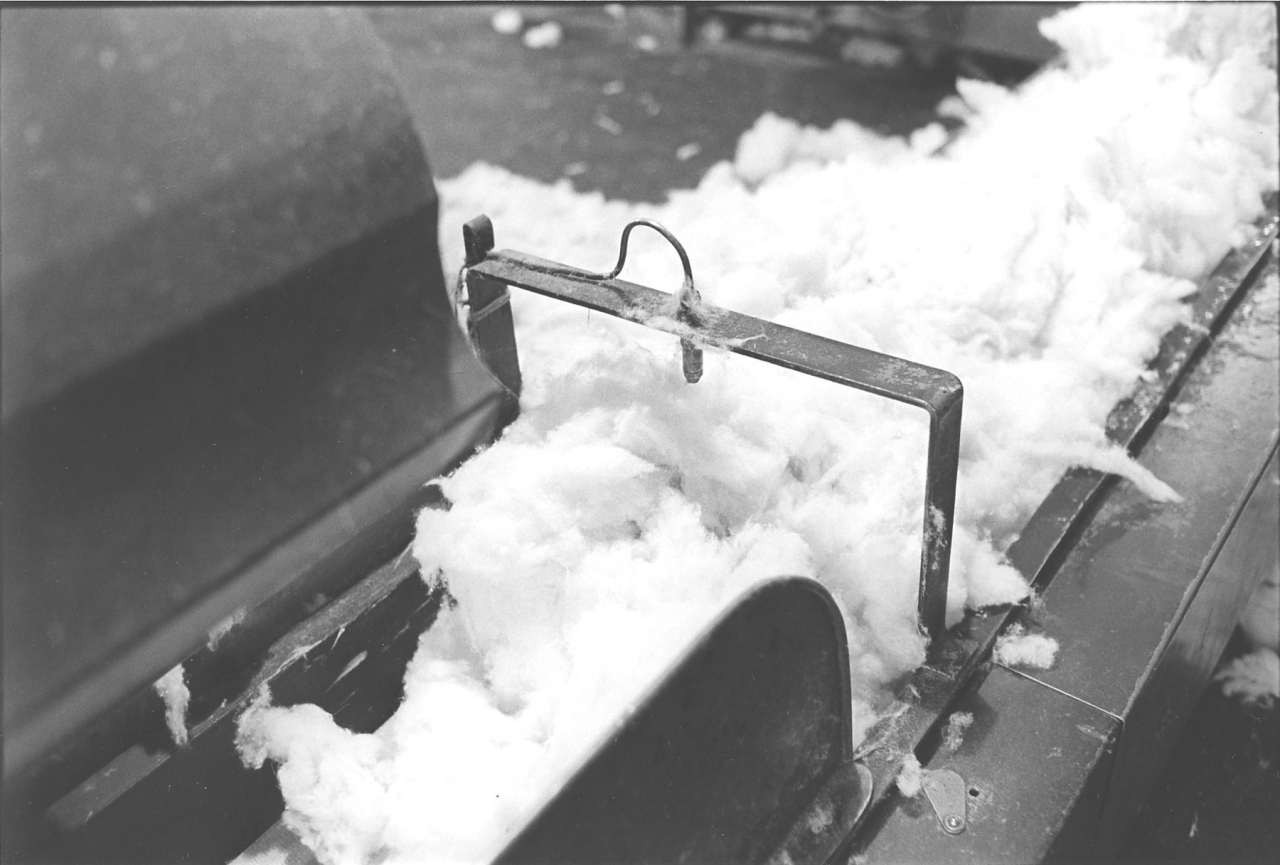
R/J – Now there you come to the lattice that all these machines feed on to.
R/C - Showing the oiling process.
R/J - Showing the oil.
Now then tell me about that, because that’s important isn't it?
R/J- It’s very important. The more oil you can get on without absolutely saturating it, the better.
SCG/28 June 2003
8,162 words.
LANCASHIRE TEXTILE PROJECT
TAPE 80/SHI/03
THIS TAPE HAS BEEN RECORDED ON APRIL 30TH 1980 IN THE CARDER’S CABIN AT SPRING VALE MILL, CHARLES LANE, HASLINGDEN. THE INFORMANTS ARE CHARLIE GOWERS, CARDER AND JOE PILLING, UNDER CARDER. THE INTERVIEWER IS MARY HUNTER.
MH Now then Charlie, I was about to ask you why it was important to put oil on this cotton? [picture 0011]
CG Well, when the cotton’s broken up into very fine pieces, practically, you might say in filament..
MH Yes
CG It’s so fluffy and light it’s impossible to make a process of it. It’s impossible to make any density, so we put as much oil on as is possible so that when it goes into the bale it starts clinging together again and making a solid bale. You wouldn’t get the same weight of bale, so when it goes into its further processes it can be used. Without any oil, or in days gone by when we, Joe and I, started, they didn’t use oil, they used soap. They used to boil this soap and put it on with a brush, a circular brush, and they used to absolutely pour it on, so it all had to be carried by hand, they used to be full, your clothes, everything, full of soap. So this was a more efficient way of doing the job, to stop people having to handle dirty stuff and getting full of it, stuck to their bodies and it were far better. Its vegetable oil and it could also have other things added to it, such things like what they call a wetting agent, yet again to make the process of .. there isn’t as much fly in the mill and it aids spinning.
MH I see. So at Spring Vale you only have oil coming through those sprinklers have you?
CG Those jets?
MH Yes.
CG Just oil and water mix. It’s a vegetable oil and it has other things put in like wetting agents.
JP We have that Penticot in haven’t we?
CG Yes, a wetting agent.
MH What did you call it Joe? (Asks for it to be spelled)
JP Penticot
MH And do you know what that is?
CG Not really. When they started with the oil, if I remember rightly, when we first went on it, it’d be very early in the 1950’s when everyone was still using soap, and the oil was first class, absolutely spot on. It was great. There was never a blocked pipe, blocked filter, it was perfect, so the years went by, and they found by cheapening the product, people still wanted it, because everyone was going on it. So it came to such a state that it was such a low quality to what it had been originally, that they started selling this other product to go into it. All means of making money. And that’s just why what’s happened today. It never needed anything.
MH Umm. Now then, from there, after its been oiled, wetted, call it what you like, what happens to it from there?
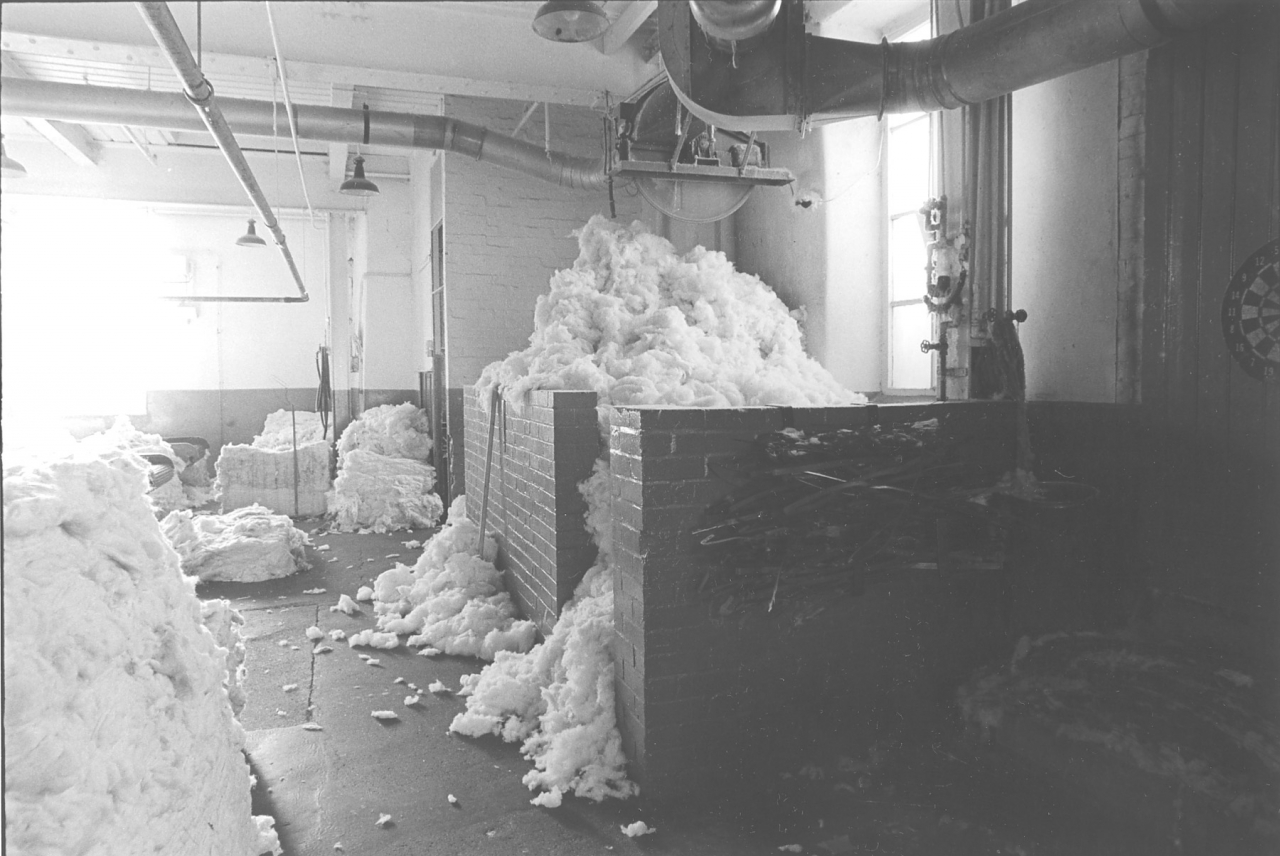
[0012]
JP Well it would be 0012, but 0011, 0012, the process just doesn’t follow it. See what it shows here is the cotton build. The cotton that comes out of the devil hole, through the flywheel and that’s oiled as well. There’s two sprays that’s round all over there.
CG Its very important that the oil is put on correctly, and just enough. You put too much on and you’ll get a different colour – it’ll stain.
JP Its got to be mixed right hasn’t it.
CG Yes, mixed right.
MH So in fact, on 0012 you’ve got the stack that’s building up from the devil, so lets go back to 0011. So on 0011 the cotton that we can see there is put into bales, am I right?
CG That is the delivery from the bale breaking machine onto a feed lattice to go to a press.
JP That goes right down to a press.
MH Excuse me one minute, if I can just skip on a bit.
CG This is the press.
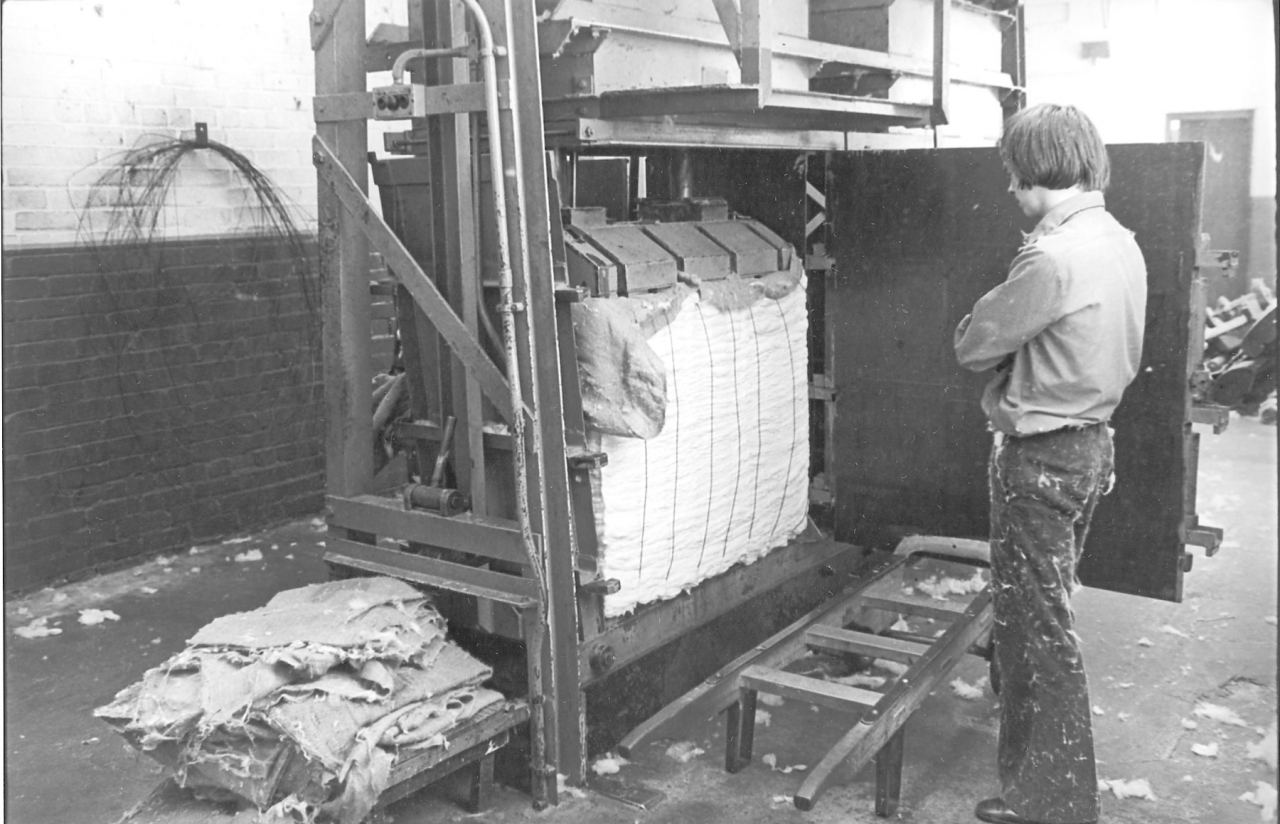
[15]
MH Did you just come to it, just then?
CG Yes.
MH Just before George starts, isn’t it?
CG Yes
MH On number 15, so from 10.01 it goes into this press, is that right? And then it goes into the warehouse?
CG As its going into this press, this is a proper type, a very good press, its filling one as one is being taken away from it.
MH Oh yes?
CG A very, very good press.
MH Can you explain how that happens Charlie?
CG Tell her Joe.
MH All right Joe? Has he dropped you in it?
JP As its making a bale..
MH Yes
JP Once it’s made a bale, they turn it right round, because there’s two sides to the press, turn it right round, the press, and this side become empty and then what we call the press side, presses the bale what’s already been made, while another one’s coming to the other side. I think that’s the best way (to explain it).
CG I think there’s just one important part about it. When it’s turned, for the bale to be taken out, there are means of passing wires through, so the bale can be wired before the press is taken off it. So when the press is taken off, the door is opened and the bale is just pushed out by hand
JP Onto the truck here
CG To be carried away.
MH Oh, the one that’s laid down? On its side?
JP They just push it over onto the truck, weigh it and take it away.
MH Then it goes into the warehouse, where it is conditioned?
JP Its better stood. Its better stood for at least two days.
CG Having been oiled it needs to stand. Two days is ideal. Three days is pretty good. The longer it stands with the oil on, the more denser it gets, the better for the next process.
MH Like a good fruit cake.
JP Like a good wine.
MH Like a good wine, all right then. Showing a bit of culture here Joe. Right, we’d better go back to where we were, so 0012. This is the stack that’s built up from the devil room, which we’re coming onto with number 11. I think you have just said, haven’t you, that there is oil and water sprinkled on here as well too?
CG Yes.
MH Now why is it put on again?
CG That is coming from the devils, which never gets no oil on the machines. Only when it is delivered. It’s not possible, unfortunately, with the processes in this mill to spray the oil on, because it must be processed, it must be carried away from the devils and passed through a pipe. Now if they started spraying it as it came off the devils it would start sticking in the pipe.
MH Right.
CG It would start sticking on the Shirley wheel. Unfortunately they made a very bad mistake at the time. They put the stack in the worst possible position, so that when they’ve made a stack it had to be carried a considerable distance to where it was being fed to make a bale. Which was just unfortunate, but they probably had to do it that way because they just didn’t have enough room.
MH No. So, where does it go from there then?
CG It goes back onto that feed lattice..
JP To make a bale
CG And it’s carried by hand.
MH So it’s carried by hand from there to there?
CG Fed on by hand, and oiled again.
MH So what comes off the blending machines?
CG The blending machines are stopped while that process carries on.
MH Is that right?
CG Yes, you have to stop the blend.
MH So you’ve got a mix of what comes off the blending machines and what comes from the devils to make a bale?
JP No, these are…
CG To make a mixing. The blending machines are made only for comber bales. Now this plant here, this stack, is only thread waste broken up. Broken thread waste, and it’s kept separately. So they make the bales separately and that’s the only way they can tell they’ve got the right production off the devils.
MH Yes, I’m with you. I’ve now got you I think.
JP Once they’ve made a bale, its put into store just the same and then when they come to put a mixing down into the middle room they’ve probably put two or three of them down wi’ em.
CG I told you when they can tell when they’ve got the mixing right..
MH Yes, I’m sorry, I had a moment or two of being a bit muddled. But yes, I’m with you now.
JP See, look, that were originally made… they never used to make cotton bales, they used to feed that onto the bale breaker.
MH Loose?
CG Yes.
JP They used to feed it on, yes, and that’s where the blender came in again up in the middle room; if he put too much of that in, which is lofty, very light, it went through before the others. You got all cotton and nothing else.
End of tape
Transcribed by Catherine Pearson November 2003.
Checked by SCG/25 November 2003
